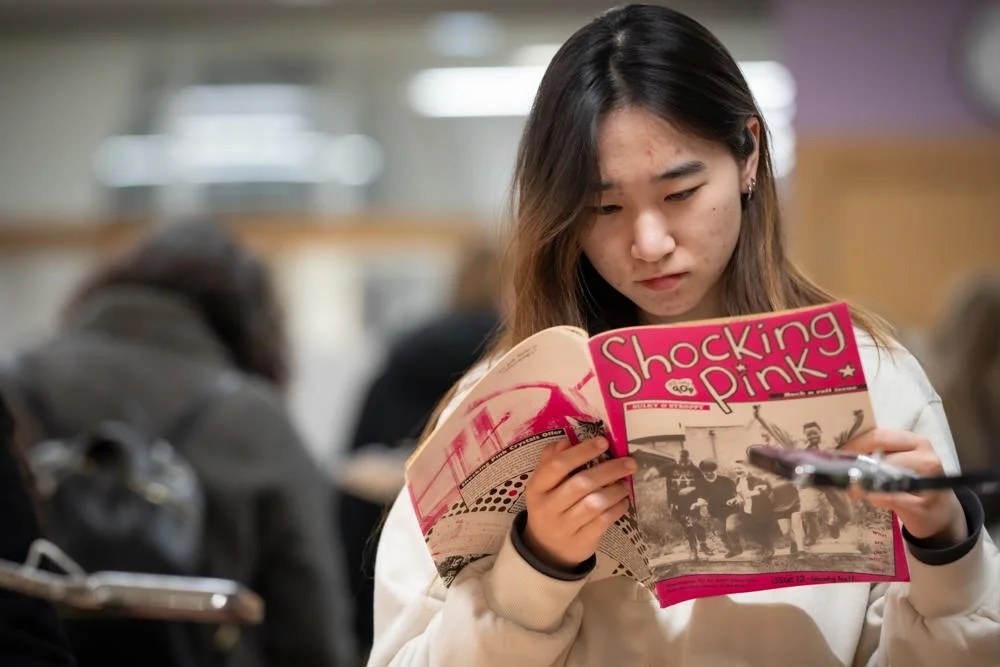Past exhibitions
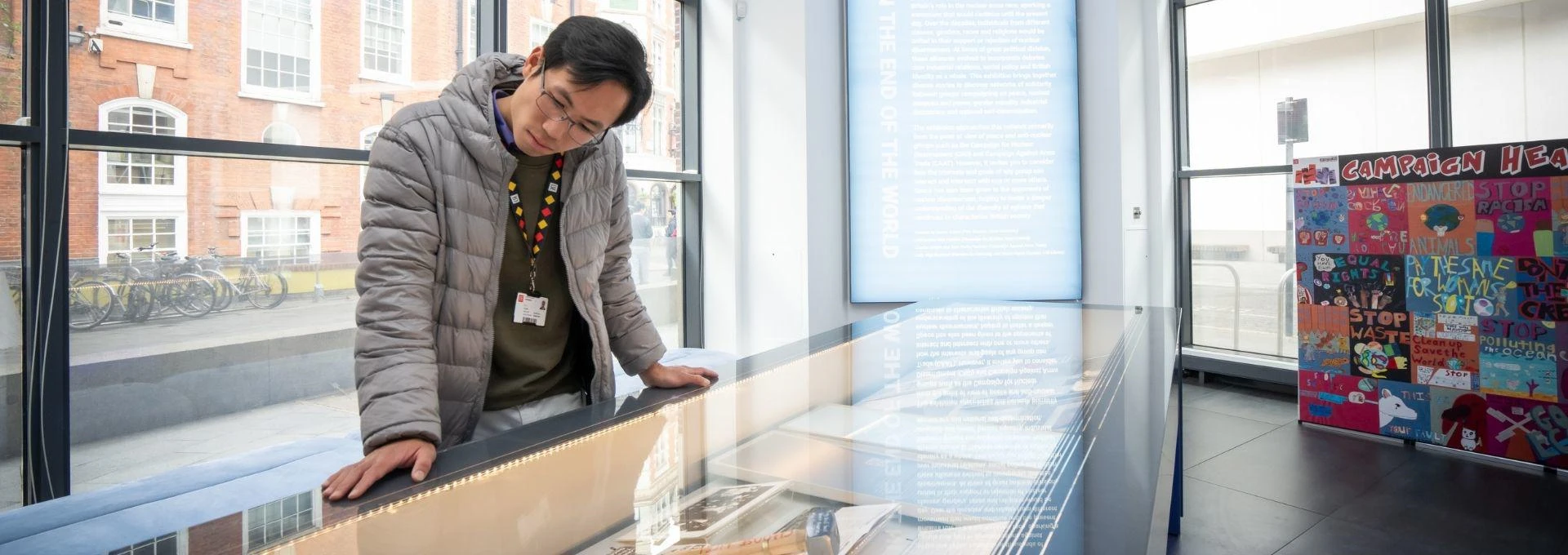
Telling the stories of our collections
Learn about each past exhibition and access related resources.
2025
Open 10 February to 22 August 2025.
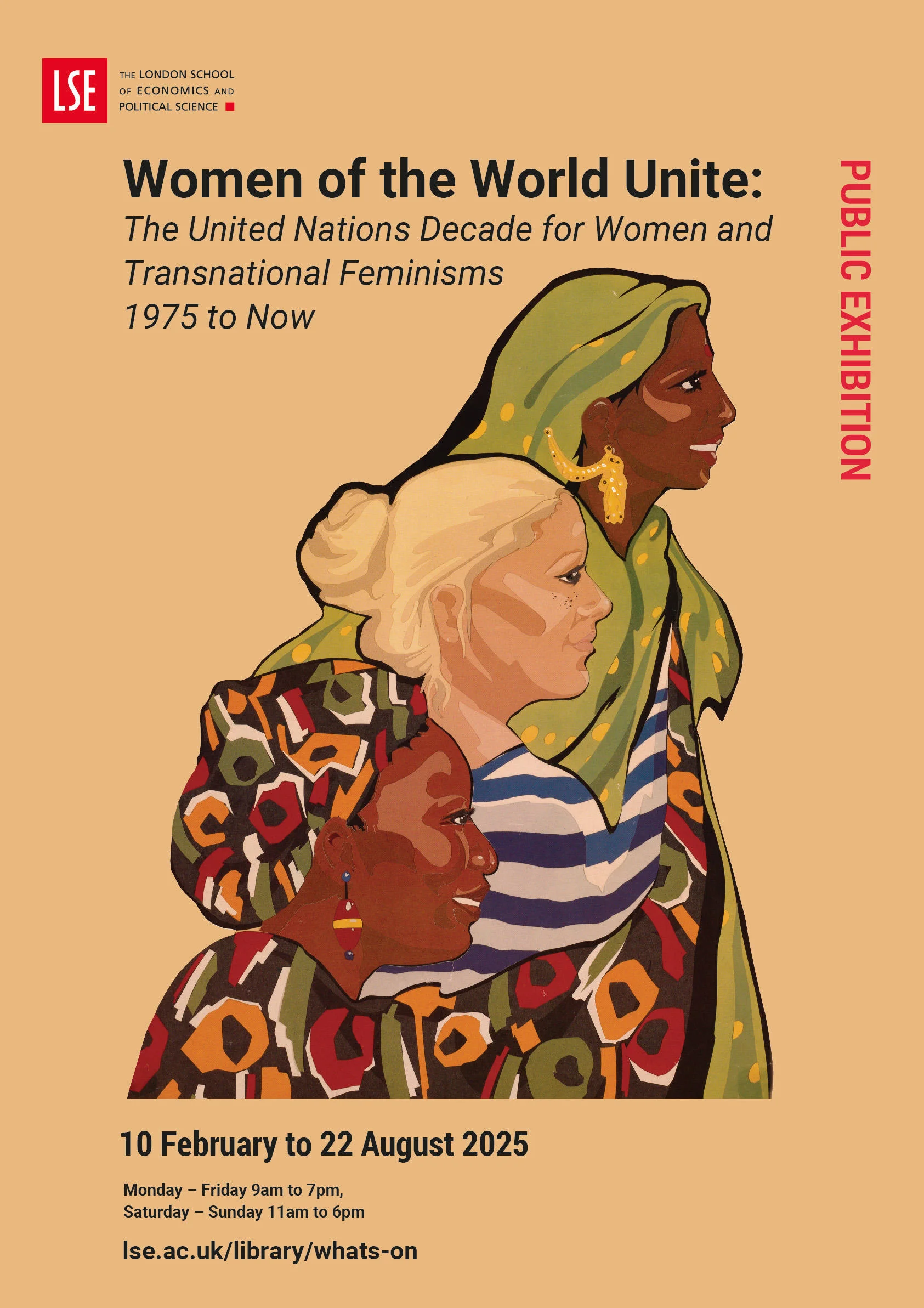
Introduction
In 1975, the United Nations marked International Women’s Year, a milestone declared by the General Assembly three years earlier. The UN hosted its first World Conference on Women in Mexico City on the broad themes of equality, peace, and development.
This exhibition explored the Mexico City conference and subsequent conferences in Copenhagen (1980) and Nairobi (1985) in what became the UN Decade for Women. A fourth landmark gathering followed in Beijing (1995), further advancing the global dialogue on women’s rights.
The exhibition also highlighted the UK’s response to International Women’s Year, where grassroots women’s activism pressurised the Labour government to pass landmark equality legislation - the Sex Discrimination Act of 1975.
Reflections
Working with Dr Imaobong Umoren (LSE International History) was invaluable in shaping this exhibition. The history of transnational feminisms is vast, but by focusing on the UN conferences for women, we were able to highlight key figures such as Lucille Mathurin Mair and Nita Barrow, who played important roles in this history. We also shone a light on networks and friendships forged during these global gatherings, such as DAWN (Development Alternatives with Women for a New Era), which is still active today campaigning for social and economic justice.
A key interactive feature asked visitors: “If there was an International Conference on Women in 2025, what would you want discussed?” Responses mirrored themes discussed at the original conferences: girls’ education, violence against women, women in conflict zones, and intersectionality. One visitor noted, “The post-its are a useful gauge for visitor reactions today.”
Read the post-it notes. [PDF]
Visitors’ comments
Excellent connection between 1975 and 2017! It all was together.
Highly impressive story of progress (or not) for women. Packs a lot of information in a small space.
very nicely curated exhibition providing micro-insights into what half the world’s population has been contending with. Well done
Resources
Listen to Imaobong Umoren interviewed by Amy and Emma of Kickass Women of History on DAWN and the UN Decade of Women.
Read about lesbians at the Fourth UN Conference on Women in Beijing in 1995 on LSE History Blog.
Read about some key items from the Women of the World Unite exhibition.
Read the full list of items displayed in the exhibition. [PDF]
2024
Open 23 September 2024 to 31 January 2025
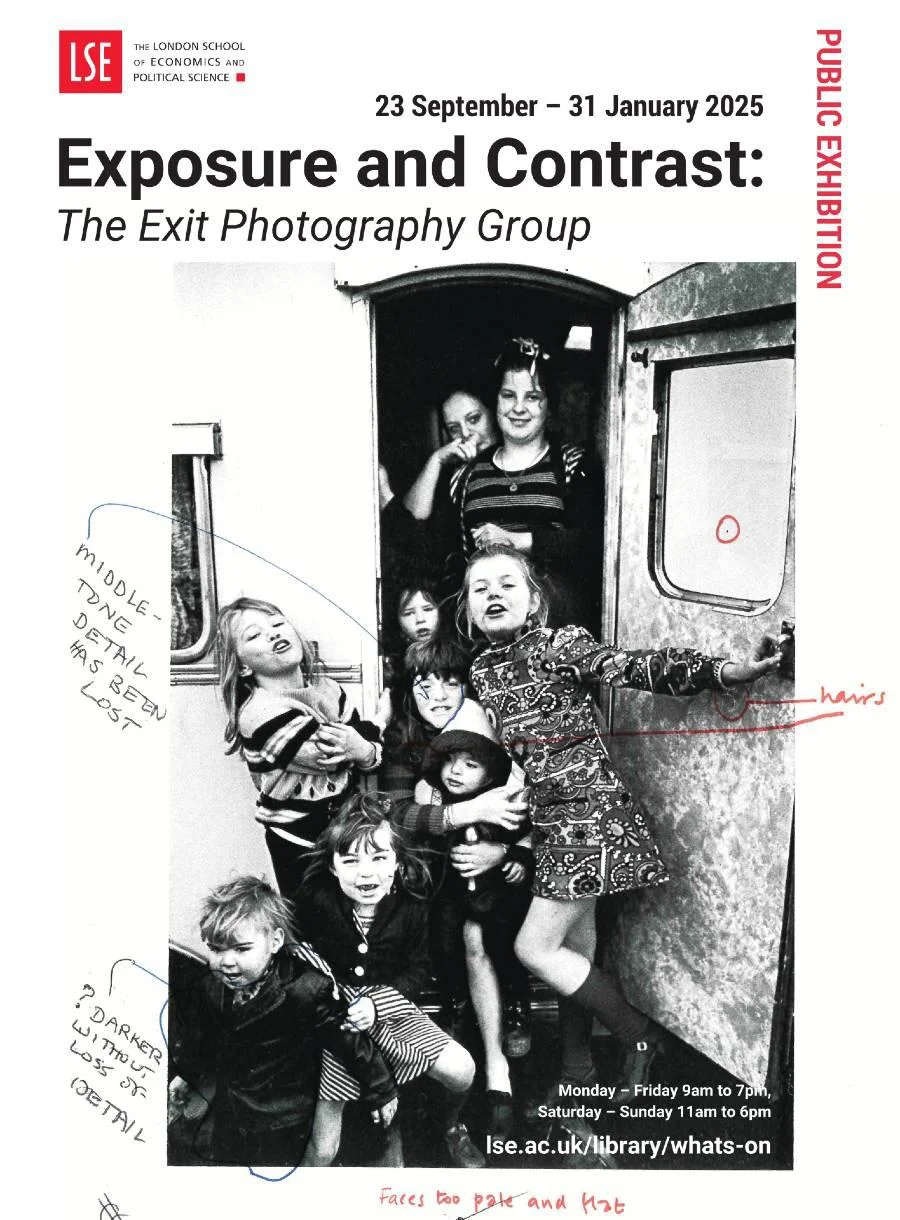
Introduction
Our 22nd gallery exhibition was an exploration of the archives of the Exit Photography Group (EPG), who published the book Survival Programmesin 1982. The book documented, through striking black and white photographs and interviews, the lives of people living in Britain’s inner cities in the mid-1970s. The archive contains a large set of photographs taken by the group which formed the basis for the display, with many of the images featuring prominently on both the Videowall plinths and the Videowall screen. The tabletop case included contextual material, predominantly from the archives of the Child Poverty Action Group.
Reflections
Indy
This was a jointly curated exhibition and I found it enormously helpful to work with both Chelsea and Cadence, particularly collaborating on the research, stories and content but also for their invaluable support throughout the exhibition’s run.
Dr Noni Stacey's book Photography of Protest and Communityfeatured a chapter written about the Exit Photography Group, using various archive materials from the collection and, following an interview, I recall thinking the photographs were captivating and would make for a good exhibition. Despite being a relatively under-utilised collection, there was a strong visual appeal and, as numerous comments in the visitor book attested, the materials evocated contemporary struggles.
Paul Trevor, one of the original three photographers was also a huge help with his support, ideas and assistance.
Chelsea
I was part of the evolving conversation about the exhibition’s narrative, which allowed me to contribute more creatively—not only to the exhibition itself but also to its programming. I particularly enjoyed selecting the images for the Survival Programmes section of the exhibition, which sparked a deeper personal interest in documentary photography in the UK.
Cadence
Given the cost-of-living crisis and rising inequality, this felt like an important exhibition to hold at this time. In addition, the exhibition coincided with the 60th anniversary of the founding of the Child Poverty Action Group, whose materials we featured in the exhibition, the 50th anniversary of Thatcher becoming leader of the Conservative party, and the 40th anniversary of the NUM miners’ strike, which formed part of the narrative of unemployment under Thatcher featured in the exhibition. The exhibition opened just two months after the election of a Labour government in July 2024, following 14 years of Conservative rule.
Photography competition
We held a photography competition inspired by the collections and exhibition. 104 images were posted by members of the public for the competition.
Audio guide
Listen to the audio guides Indy Bhullar and Paul Trevor created for the exhibition.
Story 1: Paul Trevor on the beginnings
Story 2: Paul Trevor on funding and starting out
Story 3: Paul Trevor on the photographs and photography
Story 4: Paul Trevor on the publication of their book
Lecture
We held a public lecture, Exposure and Contrast: Exit Photography lecture, which you can watch on our YouTube Channel.
Blog
Read Exposure and Contrast: The Exit Photography Group at LSE Library on the LSE Review of Books blog.
Visitors' comments
Deeply moving - a salient reminder of the iniquity that still exists
Intriguing and moving. So powerful and deep, speaks louder than words
Very interesting exhibition. I lived through this era/time in London. Sadly many of the same issues still exist
Open 29 February to 22 September 2024
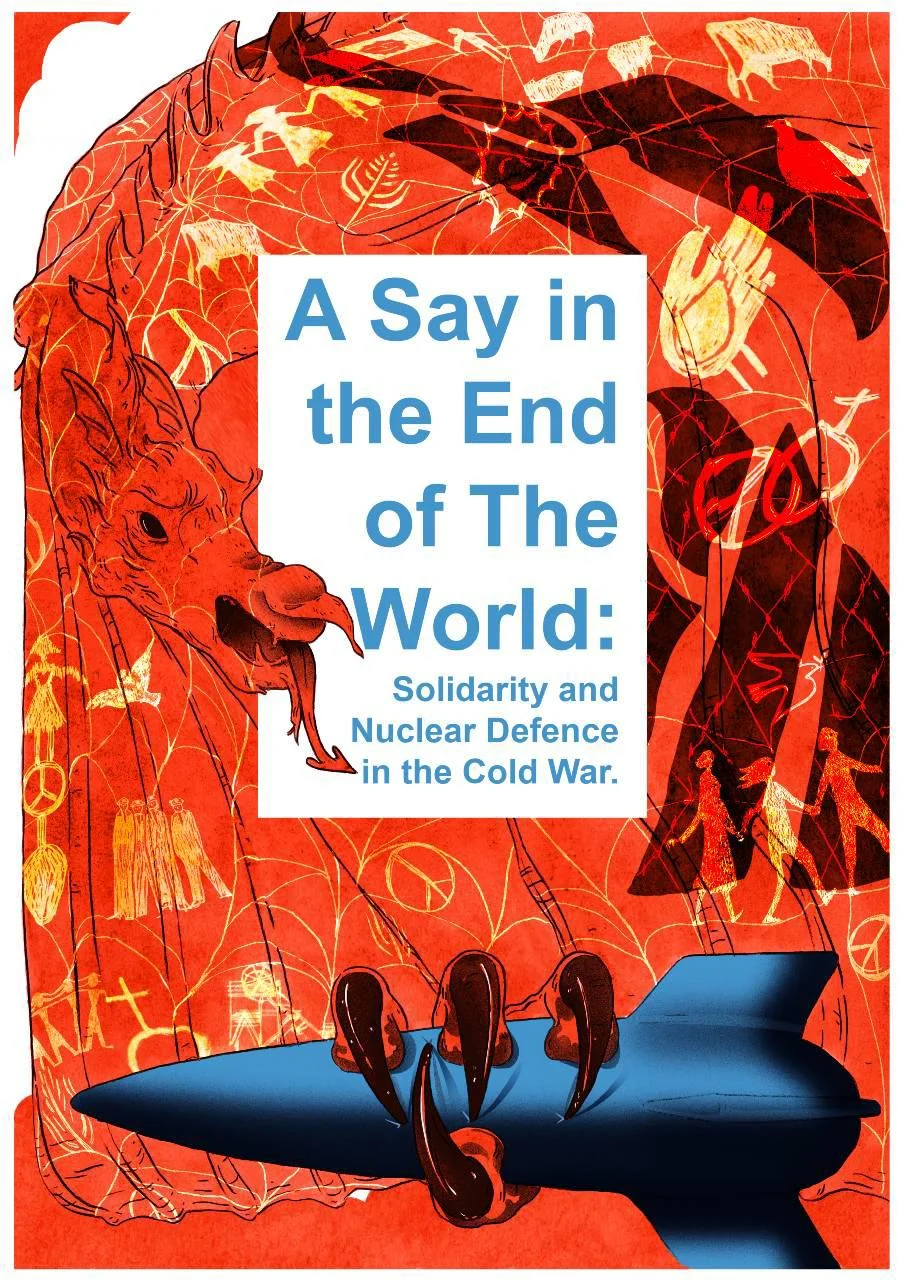
This exhibition was thoughtfully curated by guest Gareth Bryant (PhD student, Open University) as part of his collaborative doctoral award, in partnership with Daniel Payne (Curator, LSE Library). Guest curators included Charles Wright and Jon Nott from Campaign Against Arms Trade (CAT), Lady Olga Maitland (Women and Families for Defence), and Kate Hudson (Campaign for Nuclear Disarmament). The image above was produced by artist Zara Slattery in partnership with Gareth.
Introduction
In the late 1950s, hundreds of thousands of people took part in demonstrations against Britain’s role in the nuclear arms race, sparking a movement that would continue until the present day. Over the decades, individuals from different classes, genders, races and religions would be united in their support or rejection of nuclear disarmament. At times of great political division, these alliances evolved to incorporate debates over industrial relations, social policy and British identity as a whole.
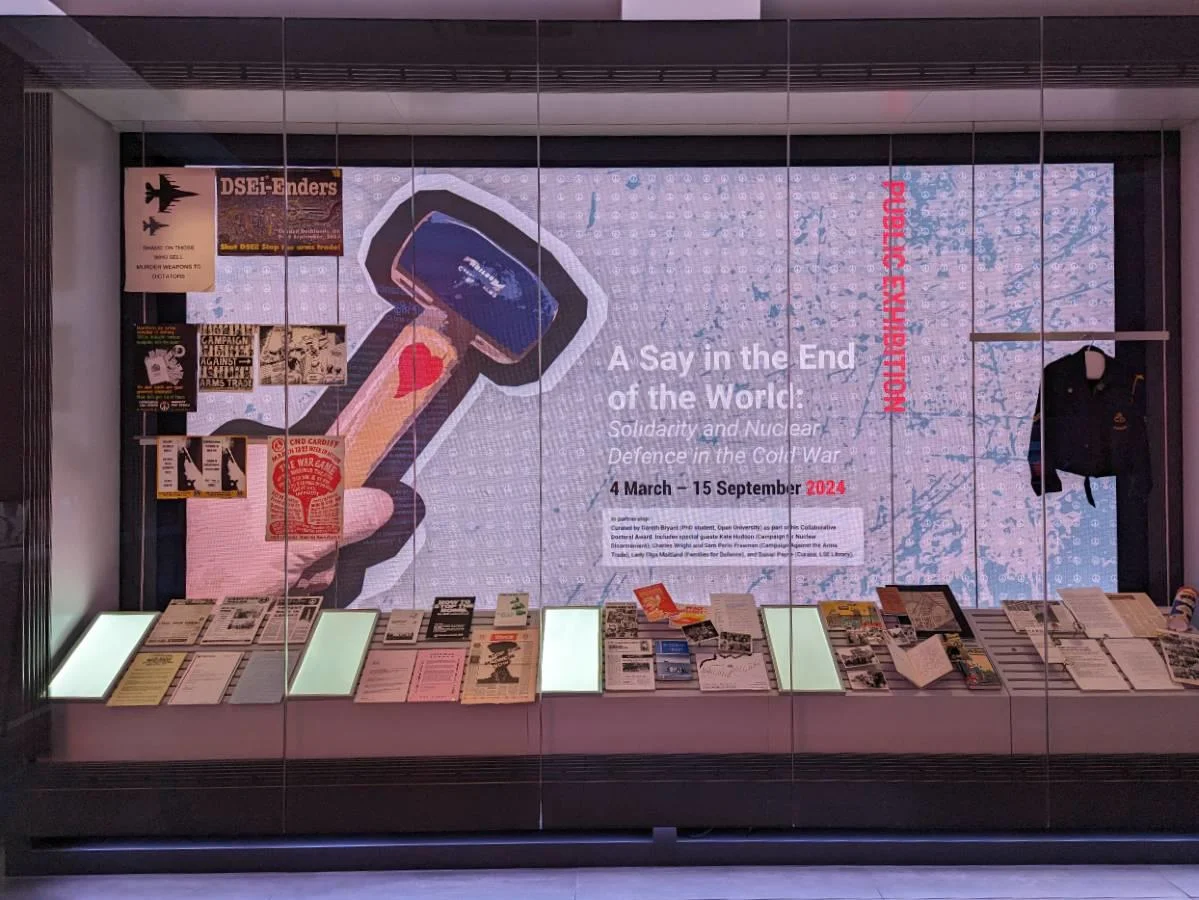
The exhibition approached this network primarily from the point of view of peace and anti-nuclear groups such as the Campaign for Nuclear Disarmament (CND) an Campaign Against Arms Trade (CAAT). However, it invited you to consider how the interests and goals of any group can interact and intersect with one or more others. Also on display were the opponents of nuclear disarmament, such as Women for Families and Defence, hoping to foster a deeper understanding of the diversity of opinion that continues to characterise British society.
Reflection
It was wonderful to bring Gareth Bryant’s academic experience as a doctoral student to the curation of this exhibition. It allowed us to explore our archive collections in great depth; particularly the archives of the CND what they had to say about solidarity, trade unionism, and national identity for Scotland and Wales. It was a very popular exhibition with over 10,000 visitors – thank you to everyone who came and engaged with the exhibition. It was also an honour to host alongside the exhibition a memorial event for Pat Arrowsmith, the extraordinary peace campaigner, and also to hear a talk from Anahita Parsa about her intersectional work on peace as a Policy Fellow at BASIC.

Visitors’ comments
LSE Library’s exhibitions are always interesting. Thank you very much for all the work and thought that goes into putting them on for us – we deeply appreciate this privilege. What did I learn? That the anti-nuclear movement was broader and more heterogenous than I had realised. Thank you for a wonderful exhibition
Very important to be reminded of this and all the people involved. Especially now: at this perilous time
It was interesting to see the archival material related to the resistance against atomic weapons in the UK. I didn’t know that British citizens fought against nuclear weapons! Now that the civil world is looking away from nuclear weapons to nuclear power, it’s probably the most prescient idea to commend work of a previous generation to protect us all from exiting so we can make His kingdom come through peace methods!
Interested in finding out more?
- Watch CAAT’s talk: "Campaign Against Arms Trade at 50: Adapting resistance to a changing world".
- Watch Lady Olga Maitland’s talk: "Families for Defence: An Argument for Nuclear Defence".
- Interested in our peace collections? Our archives are open to all. Find out more about our Peace and internationalism collections.
- The exhibition featured the newly-catalogued CAAT papers. View the CAAT catalogue.
- Watch an interview with Gareth Bryant on his experiences of curating the exhibition and writing his PhD (coming soon)
2023
Open 8 September to 4 January 2024
This exhibition was curated by Dr Tanya Harmer (LSE Department of International History) and Gloria Miqueles (Chilean exile) in partnership with Gillian Murphy (LSE Library) and Paul Dudman (Living Refugee Archive (LRA), University of East London).

Introduction
On 11 September 1973, a military coup overthrew Chile’s democratically elected socialist government and ushered forth 17 years of dictatorship. Tens of thousands were imprisoned and tortured, and more than 3,300 murdered and disappeared. In Britain, trade unionists, politicians, academics, students, musicians, church groups and others mobilised in diverse and expansive ways against the new regime. They formed part of a new global solidarity movement that shaped a human rights revolution and stimulated radical artistic and cultural production.
Chilean events, and the arrival of more than 3,000 Chilean refugees, also stimulated conversations about human rights, democracy, and refuge in Britain. This exhibition explored these conversations and celebrated Chilean contributions to Britain 50 years on.
Reflection
This exhibition was an example of what could be achieved through collaboration between LSE Library, an academic department, the Living Refuge Archive, solidarity activists, and Chilean exiles who settled in the UK. The exhibition was very colourful bringing together material in a meaningful and thoughtful way to reflect views and feelings of those who were involved. Moreover, it highlighted an unexplored theme in the Library’s collection to tell a story of solidarity and resistance. The exhibition was enhanced by a complementary website (created by Tanya Harmer) of articles, videos and images which provided an extra dimension to the physical exhibition.
Visitors’ comments
This exhibition was very insightful seeing all who stood up and fought to ensure justice is served. As a woman myself, this was beyond inspiring seeing many people before me and their accomplishments like Sheila Cassidy [British doctor kidnapped and tortured in Chile in 1975 whose TV appearances on release and subsequent memoir raised awareness - memoir was on display in the exhibition]. This whole exhibition has taught me to always keep going and never stand by when injustice is taking place.
This is part of my history. I was 7 when I fled with my parents in 1974. The wounds are still there. Thank you for remembering us.
Interested in finding out more?
- A recording of an ‘in conversation’ between Dr Tanya Harmer and members of LASTESIS, a Chilean interdisciplinary feminist collective, on the theme of Art, Rights and Resistance in the 21st century.
- LSE video 50 years after the Chilean coup featuring Tanya Harmer, released on the anniversary of the coup on 11 September 2023.
- LSE International History student talked to Tanya Harmer in the Library Gallery for a short video.
- LSE Research for the World – Resistance, Rights and Refuge: the importance of memory 50 years after the Chilean Coup.
- LSE Review of Books blog - Tanya and Gloria’s reflection on seven items in the exhibition.
Curated by Daniel Payne. Open 13 February to 20 August 2023
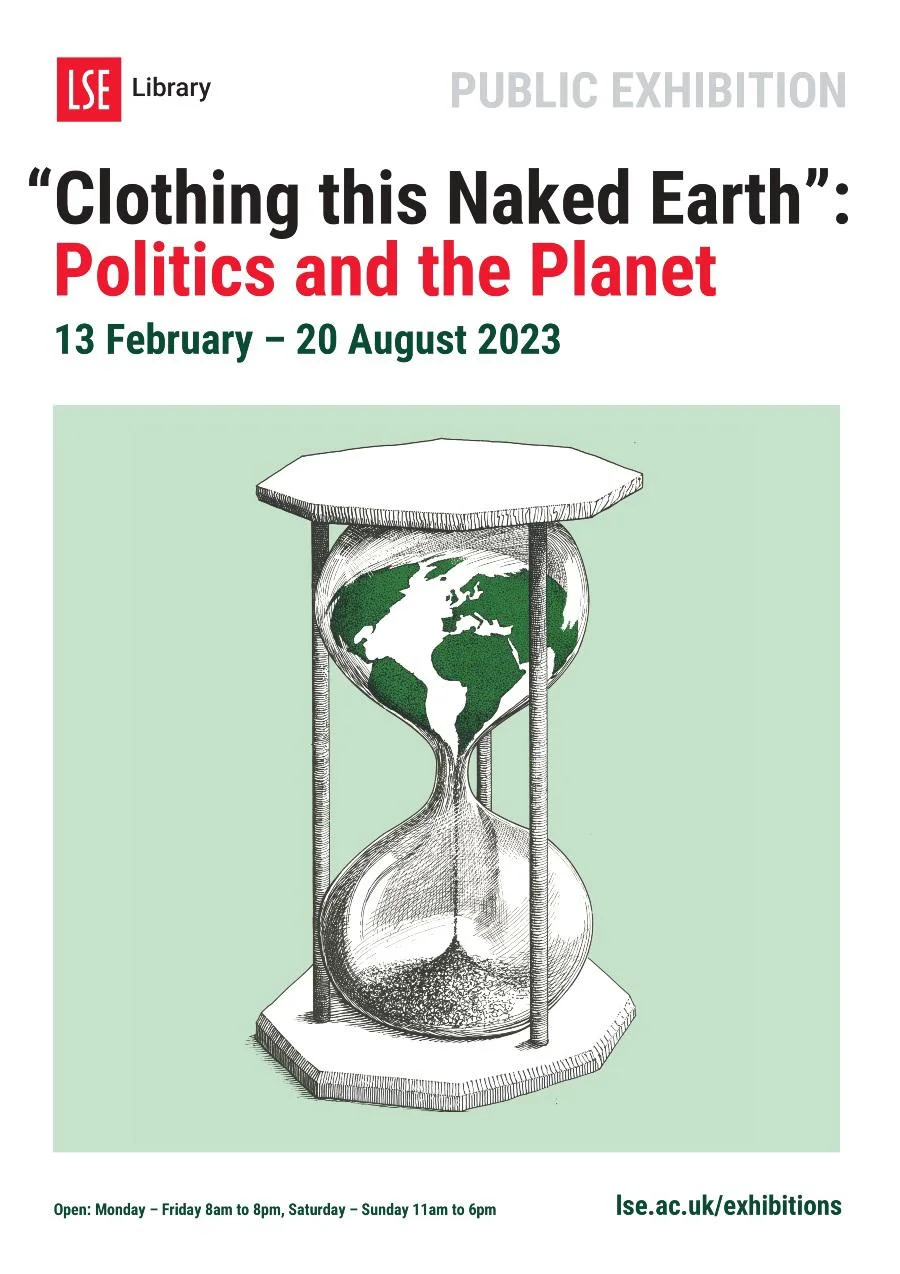
Introduction
What do we find in the LSE Library and Women’s Library archives and special collections if we look for the earth?
This exhibition brought together some of the stories that offer answers to this question; from the Keep Britain Tidy campaign (founded by chair of the National Federation of Women’s Institutes Elizabeth Brunner), to the extraordinary series of women’s protests held at Greenham Common in the 1980s and 90s.
The exhibition also marked LSE Library as the new home of the archives of the Green Party of England and Wales, which celebrates the 50th anniversary of their founding in 2023. Beginning life in Coventry as PEOPLE in 1973, special guests Mitya Pearson (King’s College, London) and the Green Party Archives Group curated objects from this new and important collection.
Reflection
It was interesting to put together an exhibition on the theme of the environment, as this is something we had not looked at extensively before. It revealed many interesting overlaps between protest movements and political parties. It was also a great opportunity to mark LSE Library as the new home of the archives of the Green Party of England and Wales, which represents a fantastic new resource for researchers.
This is a significant collection for the whole Green movement and not just the Green Party of England and Wales. It's great that the archives now have a home at the LSE. This exhibition only gives a taste of the many fascinating original documents to explore and which make clear the impact the party has had nationally and across Europe
Jean Lambert, Green Party Archive Group and former MEP
It’s been a very interesting experience to look at archives that speak about the environment within our collections, as it’s a theme I’ve not explored before. I chose the title Clothing this Naked Earth from the memoir of Wangari Maathai, which appears in the exhibition. My favourite item on display is a jumpsuit worn by one of the protestors on a march to Greenham. Having objects like these as well as text-based ones really brings it to life.
Daniel Payne, Library curator
Visitor comments
Nearly 9,000 people came to visit our exhibition, and left some lovely comments in our guestbook:
Thank goodness for archivists and people who know what to keep and not to throw away! Fascinating to see some of the early documentation. Everything has to start somewhere
A very interesting exhibition and thank you for giving a positive example about Libya
On international women’s day I am inspired by the women of the past, present and future. Their role in making this world a better place should always be remembered.
Related content
- Have a look at the catalogue entry for the Green Party archives and the papers of Jonathan Porritt, and come see them in person!
- Watch this talk from Judy Ling Wong OBE talking about her work with the Black Environment Network (BEN)
- Is there an Alternative to "Growth, Growth, Growth"– watch our launch event with Caroline Lucas MP, Molly Scott Cato, Tim Jackson and Paul Ekins
- Read this article for Green World by Dr Mitya Pearson
2022
Curated by Indy Bhullar. Open 11 October 2022 to 23 January 2023
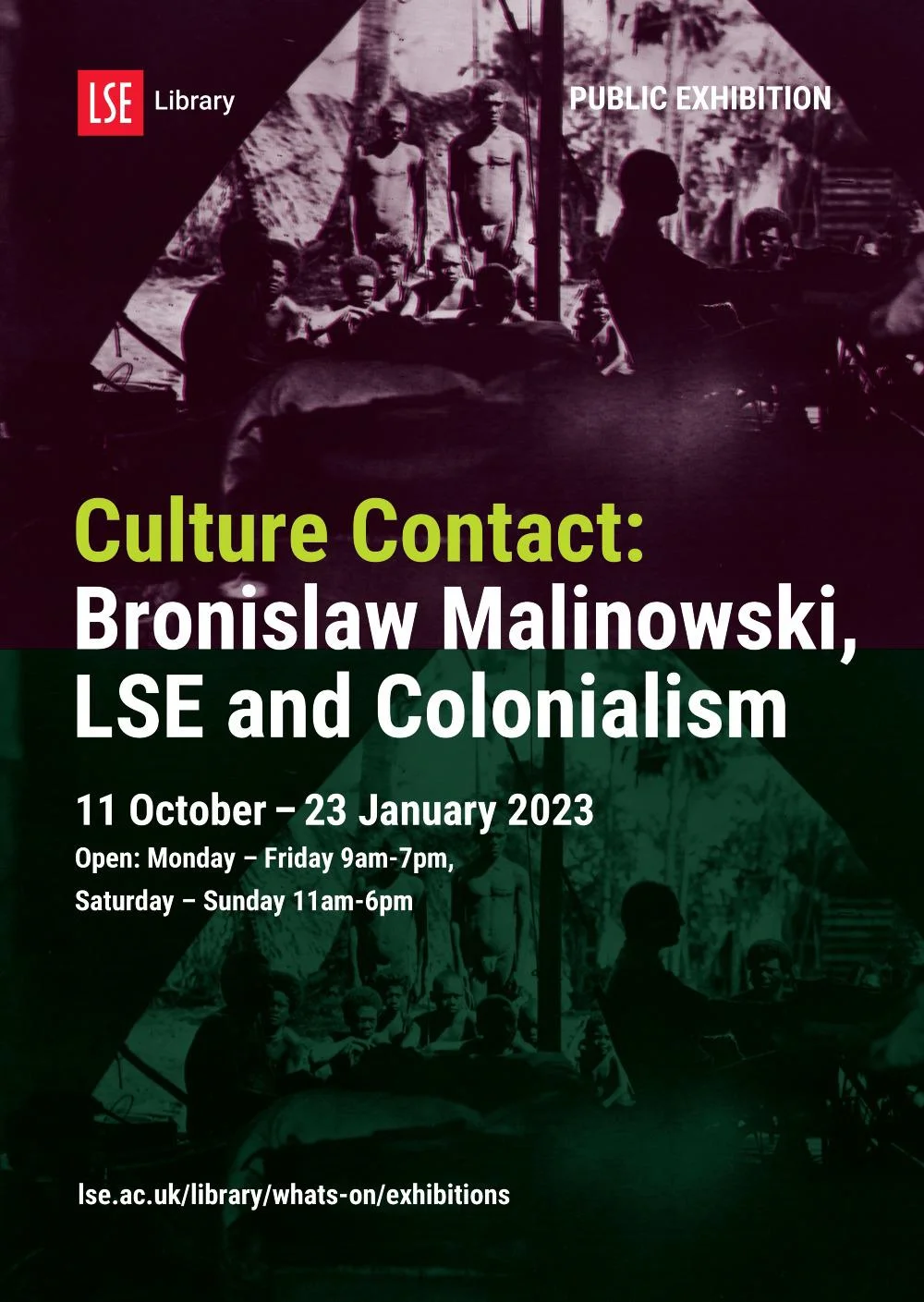
Introduction
Culture Contact told the story of Bronislaw Malinowski who was one of the key figures in the history and development of anthropology. He is closely associated with LSE where he arrived as a research student in 1910. His 1922 book Argonauts of the Western Pacific, about the people who lived on the Trobriand Islands, introduced a new way of not just thinking about but also carrying out anthropological research and the exhibition marked the centenary of the publication of the book. However, his work was also shrouded in controversy following the publication of his private diaries during the 1960s and his use of racist language to describe the people of the islands.
Reflection
Malinowski’s time at LSE coincided with it becoming one of the pre-eminent centres of learning, particularly in the social sciences. His research and writings made significant contributions to this, however his status as an academic ‘big beast’ came under a lot of scrutiny following the publication of his private diaries which revealed his troubling thoughts and feelings about the people and had a considerable impact on reshaping the idea of anthropology as an objective practice.

The second half of the exhibition also featured some of the many black students who came and studied under Malinowski at the School during his time at LSE and made for a fascinating glimpse into life at the School in this period of time and its place in wider black history.
The exhibition was again a united effort and wouldn’t have happened without the excellent help of our Design Team and the great work done by James McGrail to create an audio guide for the exhibition which you can listen to below.
Visitor comment
I'm in the process of writing an essay on 'Do you have to do fieldwork to be an anthropologist' where I criticize Malinowskian fieldwork. So thank you for providing me with these first-hand sources. (But I'm doing fieldwork to fairly criticize him aren’t i?) And it's also pretty sad that almost everyone who's written an elaborated comment is an anthropology student. But we're much more critically aware of this than the general public (as we should be). However, the public need to be aware of these issues as so many of us, including myself, had been or still is, a Malinowski when making intercultural contact. I hope more people can be aware of the legacy of colonialism, not just anthropologists echoing themselves.
Related content
Listen to James McGrail’s audio guide
Watch the event 'Malinowski, Decolonisation and Race' (with Decolonising LSE)
Open 5 May to 2 September 2022
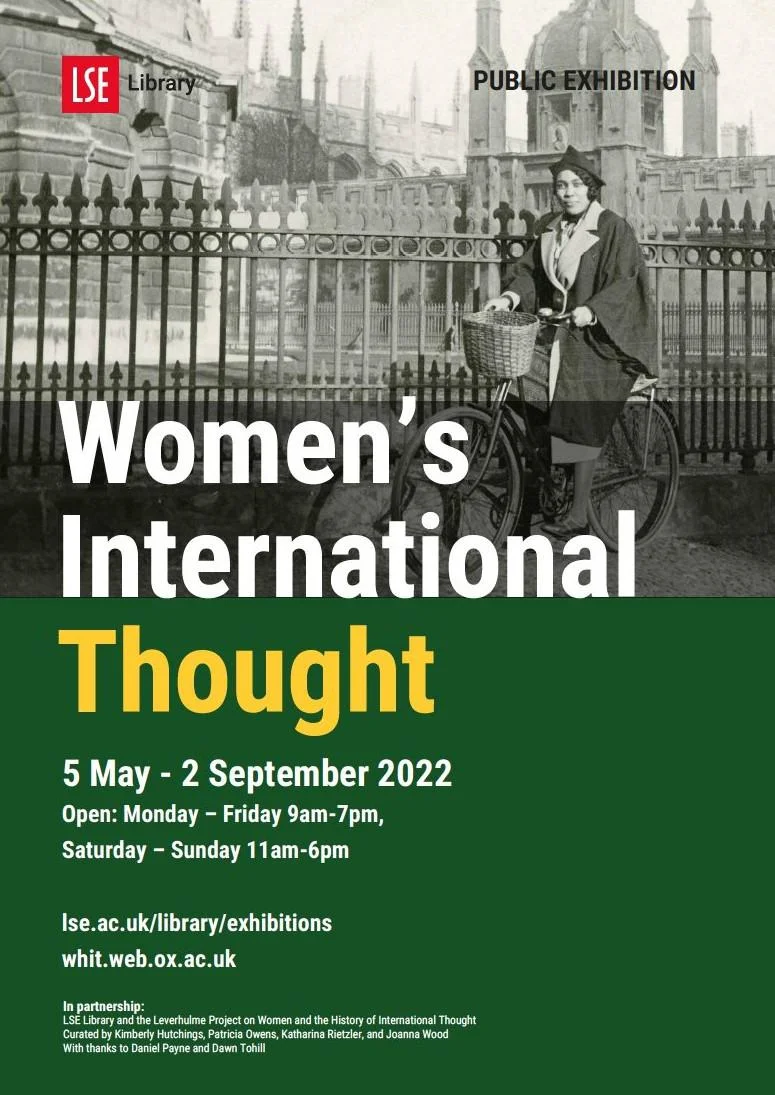
This exhibition was part of the University of Oxford Leverhulme Trust funded project Women and the History of international Thought, curated by Patricia Owens, Katharina Rietzler, Kimberly Hutchings, and Joanna Wood.
Introduction
This exhibition explored the ideas, genres, and contexts of women’s international thinking in Britain and the United States in the first half of the twentieth century. A period of colonial and anti-colonial struggles, superpower rivalry, racial, class and gendered conflicts, the legacies of these times – and these women’s ideas - are still with us today. Curated by the Leverhulme Project on Women and the History of International Thought, the following exhibition explores women international thinkers and their work at a fundamental moment in the imagining of international relations.
Selected images and quotes from our curators
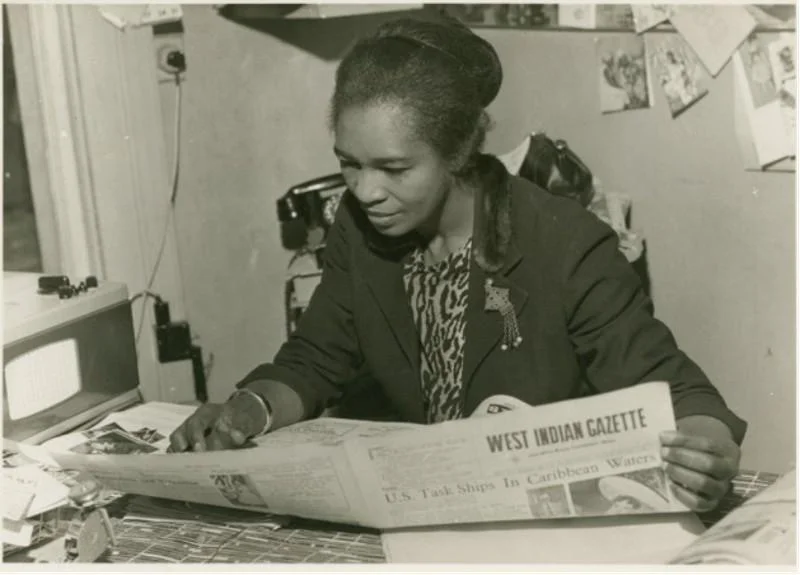
I love this image of Claudia Jones reading a copy of the West Indian Gazette, which she founded in 1958 and edited after she was deported to Britain from the United States because of her radical left and anti-racist work. It’s included in a display where we feature the work of four leading Black internationalist thinkers of the early to mid-twentieth century, Amy Ashwood Garvey, Una Marson, Merze Tate, and Claudia Jones.
Patricia Owens, Professor of International Relations, Oxford University
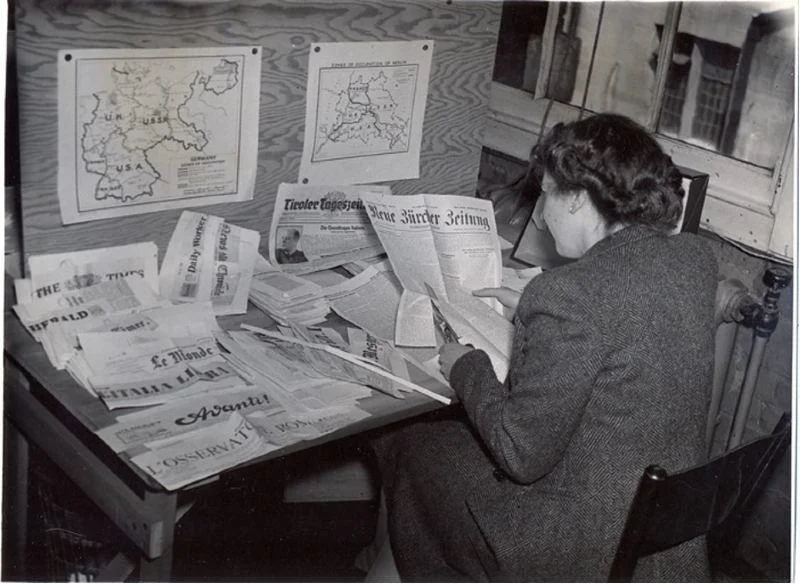
This image was taken soon after World War II, in the newspaper clippings department of the foreign affairs think tank Chatham House. The unknown woman in the image is cutting out a newspaper column, which would then be catalogued and filed away, delivering the raw material for one of Chatham House’s many publications. The mostly male authors who published surveys and books on international affairs could not have completed their work without this crucial process of mining the ‘raw facts’. I am fond of this image for many reasons, but not least because it reminds me of the historian Gerda Lerner’s demand that the recovery of women’s intellectual history cannot focus on exceptional women only – the unexceptional ones are just as important.
Katharina Rietzler, Senior Lecturer in American History, University of Sussex
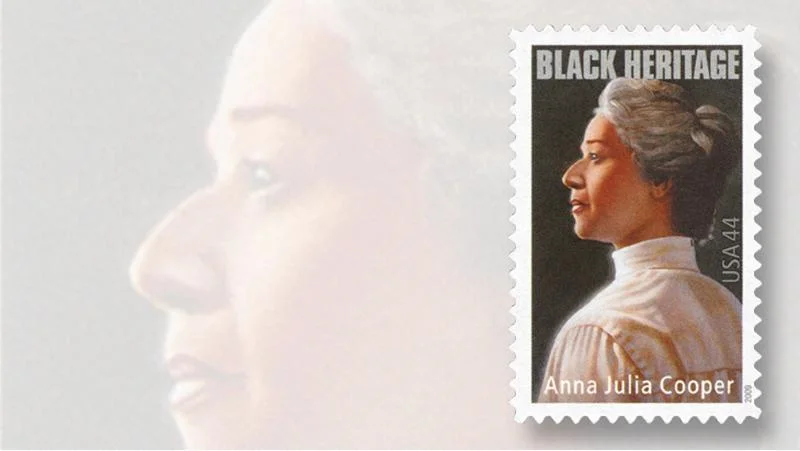
This is my favourite image from the exhibition, included in the exhibit on Women and the Canon of International Thought. It is a US postage stamp, produced in 2009 as part of a series celebrating black heritage. It is a brilliant picture, with Anna Julia Cooper looking commandingly into the distance, but also a stark reminder of how recently Cooper’s work gained any recognition at all, let alone as a contribution to international thought. It is sobering to note that Cooper’s brilliant Sorbonne PhD thesis, Slavery and the French Revolutionists, which she had to defend to a white supremacist examiner, was only published 60 years after she was awarded her doctorate and more than twenty years after her death.
Kimberly Hutchings, Professor of International Politics, Queen Mary University of London
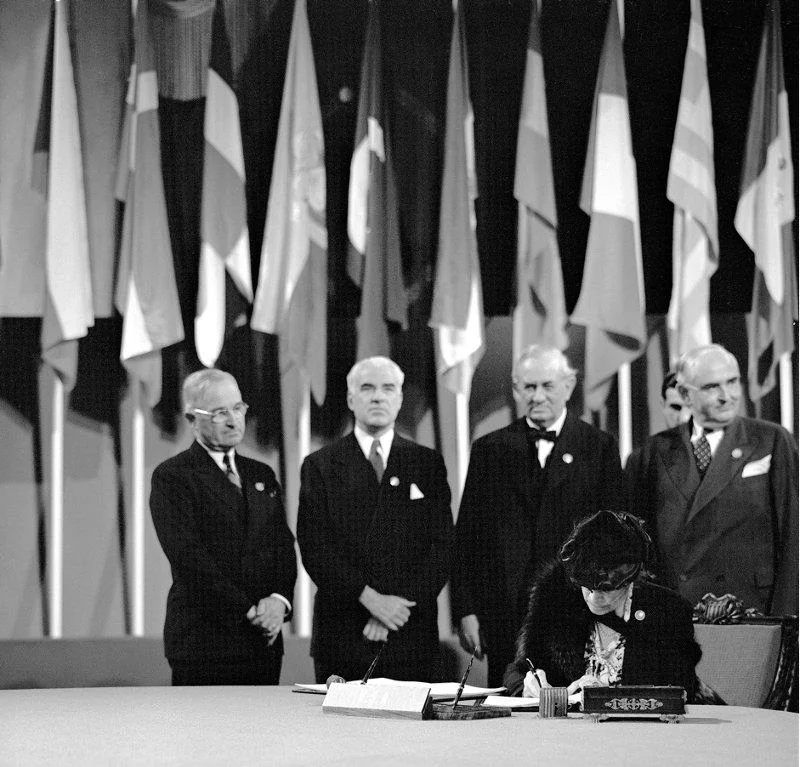
This photo of Virginia Gildersleeve, Dean of Barnard College, signing the United Nations Charter in 1945 surrounded by men, for me really captures the heights and contradictions of the interwar world of women’s international thought. Simultaneously prominent and minoritised, educated women in the US made foundational contributions to international relations through the interrelated, predominantly white worlds of the academy and women-led organisations. Alongside Gildersleeve, the only woman US delegate, multiple women served as technical experts, advisors and assistants to the US delegation, many holding PhDs and academic jobs.
Joanna Wood, DPhil Candidate in International Relations, University of Oxford
Image credits
Claudia Jones image courtesy of the Schomburg Center for Research in Black Culture.
Clippings image courtesy of Chatham House, the Royal Institute of International Affairs.
Stamp image courtesy of US Postal Service, Black Heritage Series, 44-cent Anna Julia Cooper Commemorative Stamp, Issued 2009. Further details of the stamp.
UN Charter image courtesy of UN Photo/McCreary.
Take-down policy
Visitors’ comments
A fascinating exploration of women and international relations. Love the examples and photographs. Thank you for the excellent podcasts to accompany the exhibition on the website.
Small exhibition, but worth the two mile walk from London Liverpool Station. Going to learn more about Merze Tate now
I might apply to LSE, especially after seeing this exhibition – 10 year old girl. Cya in 10 years
This exhibition has further opened my eyes to the amount of positive change and impact that women have contributed to society. As a black women, it has shown me change that people like me had made in history and still continue to make, from anti colonial internationalism to journalism this raised so many global issues. I am a strong black women. My gender and race do not deprive me of my abilities. I too can create change.
Interested in finding out more?
2021
This was an online only exhibtion curated by Daniel Payne over COVID lockdowns and available online.
This was an online only exhibtion curated by Dr Gillian Murphy over COVID lockdowns and available online.
2020
This was an online only exhibtion curated by Indy Bhullar over COVID lockdowns and available online.
Curated by Dr Gillian Murphy. Open 20 Jan to 3 April 2020.
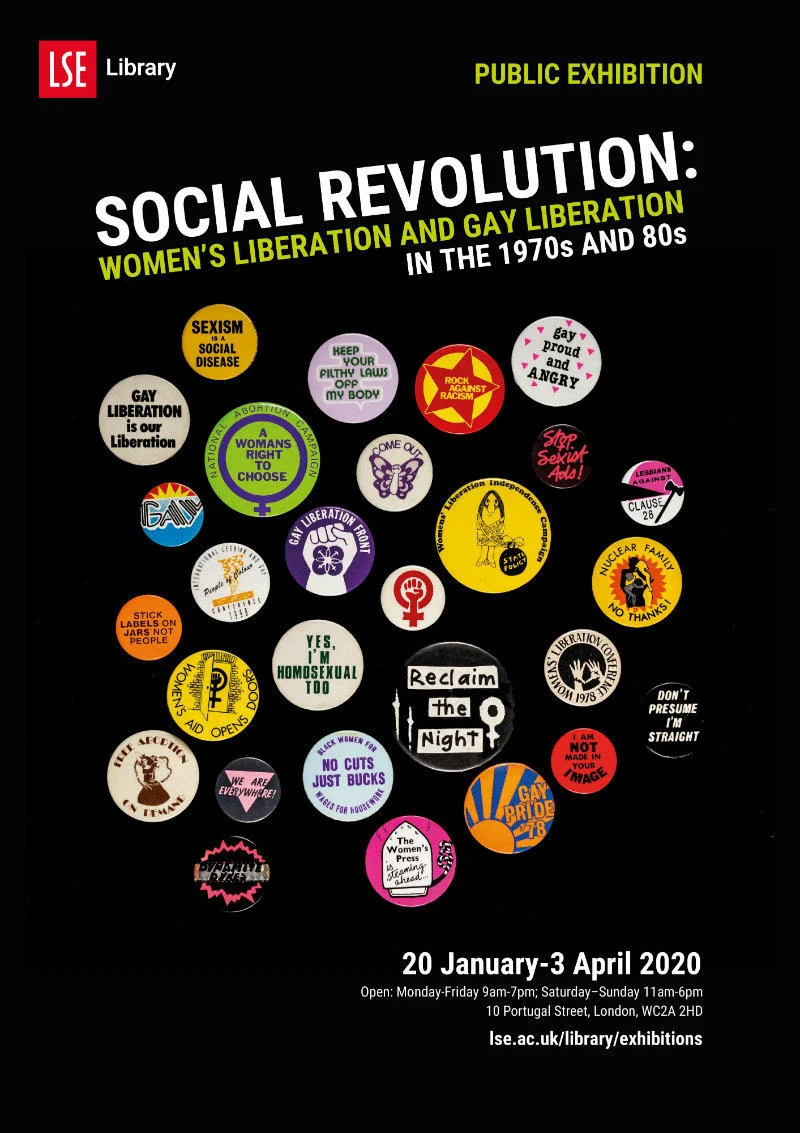
Introduction
This exhibition marked 50 years since the beginnings of two significant social movements in the UK: the first women’s liberation conference in Oxford and the first meeting of the Gay Liberation Front at LSE. Using material from The Women’s Library and the Hall-Carpenter Archives, the exhibition concentrated on the cultural impact of women’s liberation and gay liberation, and while the effects were felt worldwide, the focus of the exhibition was on London and Oxford.

Reflection
LSE Library holds a vast collection of material relating to the women’s liberation movement and relating to gay liberation, each movement really warranting its own exhibition. The challenge for me was to find overlaps between the movements that would tell their story in the Library Gallery.
Gay liberation identified with women’s liberation because they saw both as being oppressed by society. One direct overlap between the movements was when members of the Gay Liberation Front joined women’s liberation activists at ‘sit ins’ at the Wimpy Bars in west London because they refused to serve women if they were unaccompanied after midnight. The action was successful and the management of Wimpy Bars backed down.
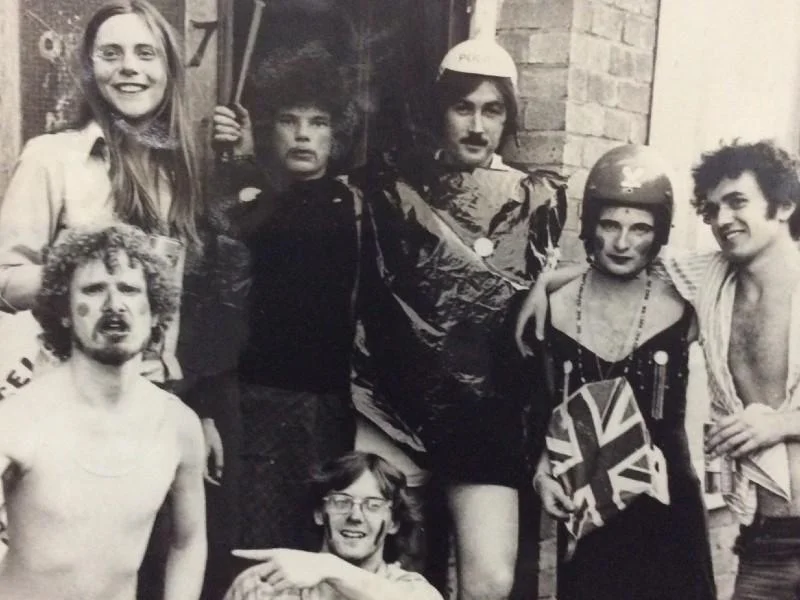
Another huge overlap is that both movements were highly creative. Both movements challenged the way women and LGBT people were represented in the media, in art, in literature and in theatre and film. Artists, designers, poster collectives and cartoonists attempted to produce a new kind of imagery that related to collective experiences and challenged stereotyping. Specialist presses and radical bookshops were established to promote the ideas of women’s liberation and of gay liberation, through fiction and non-fiction, as well as providing an outlet for writers ignored by the mainstream press. A vibrant theatre scene emerged around women’s liberation and gay liberation and plays were often used as a form of political campaigning.
Visitor comment
Unfortunately, the exhibition had to close early because of the national lockdown in March 2020.
The exhibition was insightful and offered a glimpse into the history of social movements in the UK, as well as the role LSE played in this history. I think the preservation of this history is crucial for social movements to keep learning and moving forward.
LSE Sociology student
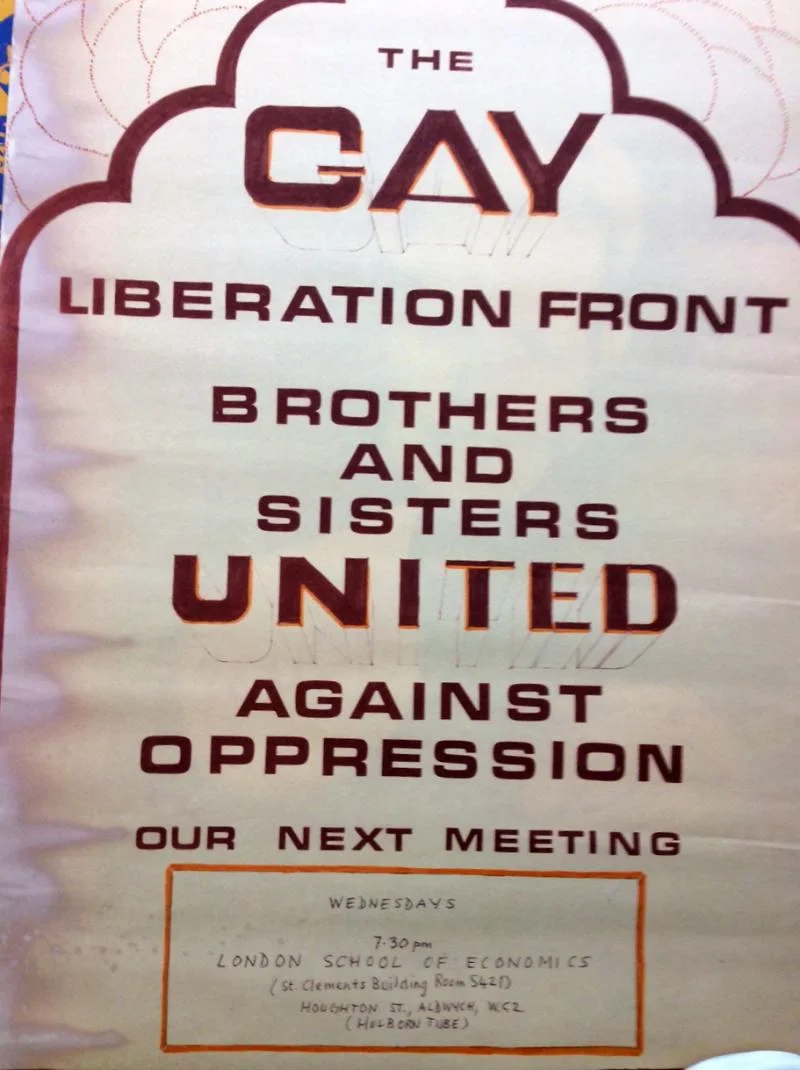
Related content
- Find out about five items that were displayed in the exhibition.
- Read more about the beginnings of women’s liberation in Britain.
- Find out about our women’s liberation movement archives and our LGBT collections.
- Listen to Prof Margaretta Jolly Storying Feminist History: sisterhood and after: an oral history of the UK Women's Liberation Movement.
- Listen to Sue O’Sullivan and Matt Cook talk about squats and collectives in 1970s and 80s London.
- Listen to Savitri Hensman talk about faith and her sexuality.
2019
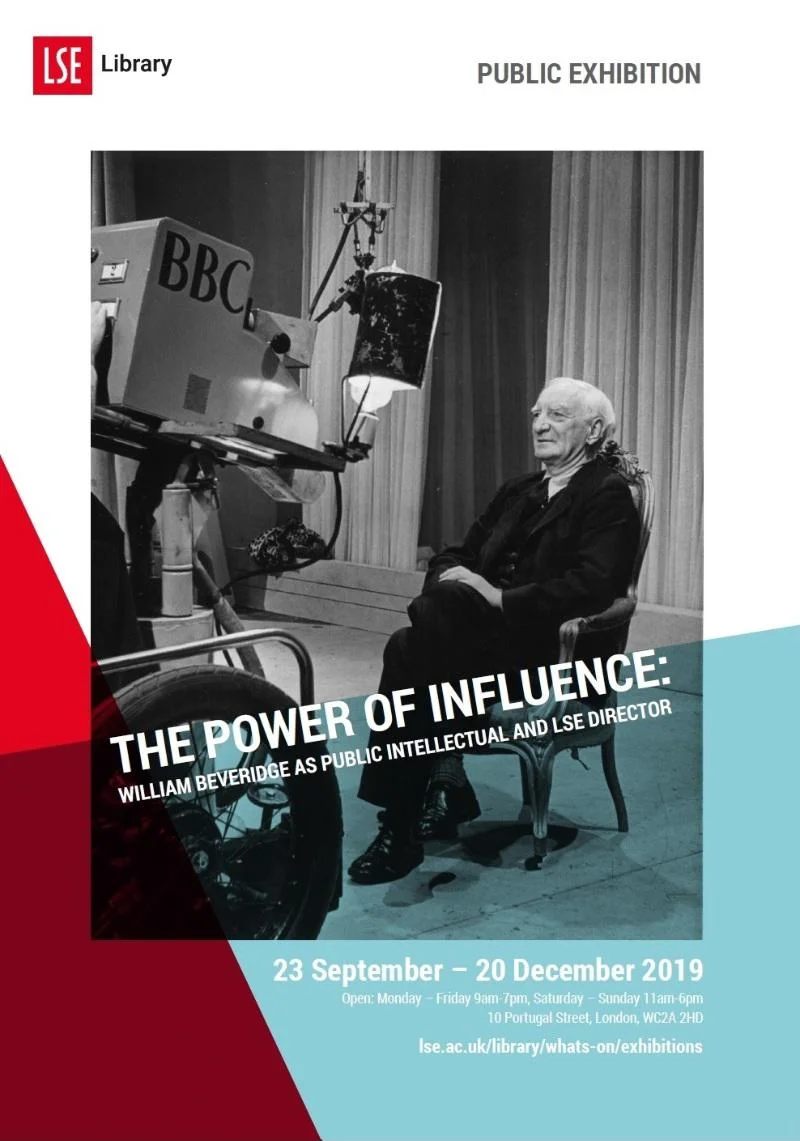
Introduction
The focus of the Library’s 2019 Michaelmas exhibition was the appointment of one of the School’s most famous former Directors, William Beveridge.
Beveridge’s time in charge (1919-1937) marked a period of significant change for the School reflected also by the broader turbulence of the 1920s and 30s. The exhibition therefore had one eye on Beveridge’s role in moulding the School but also another which drew attention to his work in the context of the wider world.
The exhibition’s first focus was Beveridge’s attempts to establish a department of Social Biology. Beveridge was a eugenicist, like many of his intellectual contemporaries, and his firm belief in the empirical basis of the natural sciences led him to founding the department which it was hoped could lead to insights and bridge the gap between natural and social sciences.
In the second part of the exhibition we focused on Beveridge's role in establishing the Academic Assistance Fund at LSE in 1933. The fund pooled donated money from teaching staff at the School to help support 'non Aryan', predominantly Jewish, academics who were being expelled from teaching positions as the Nazi's took power in Germany. The Fund became the Society for the Protection of Science and Learning and went on to help hundreds of people escape totalitarian regimes.
Reflections
William Beveridge had already featured in our 2017 exhibition about the Welfare State but there was still plenty to say about him. His time as head of the School was full of fascinating stories and there were myriad directions that could have been taken his time here.
I wanted to attempt to reflect more deeply on Beveridge’s time here and included topics that were sensitive and controversial rather than a simple chronological overview rehashing his achievements. I think it worked and I’m happy that the stories in the exhibition allowed us to reach out to others who have also been reflecting on the role of eugenics in British history. It also allowed us to show something more of the human side, warts and all, of one of the previous century’s key figures.
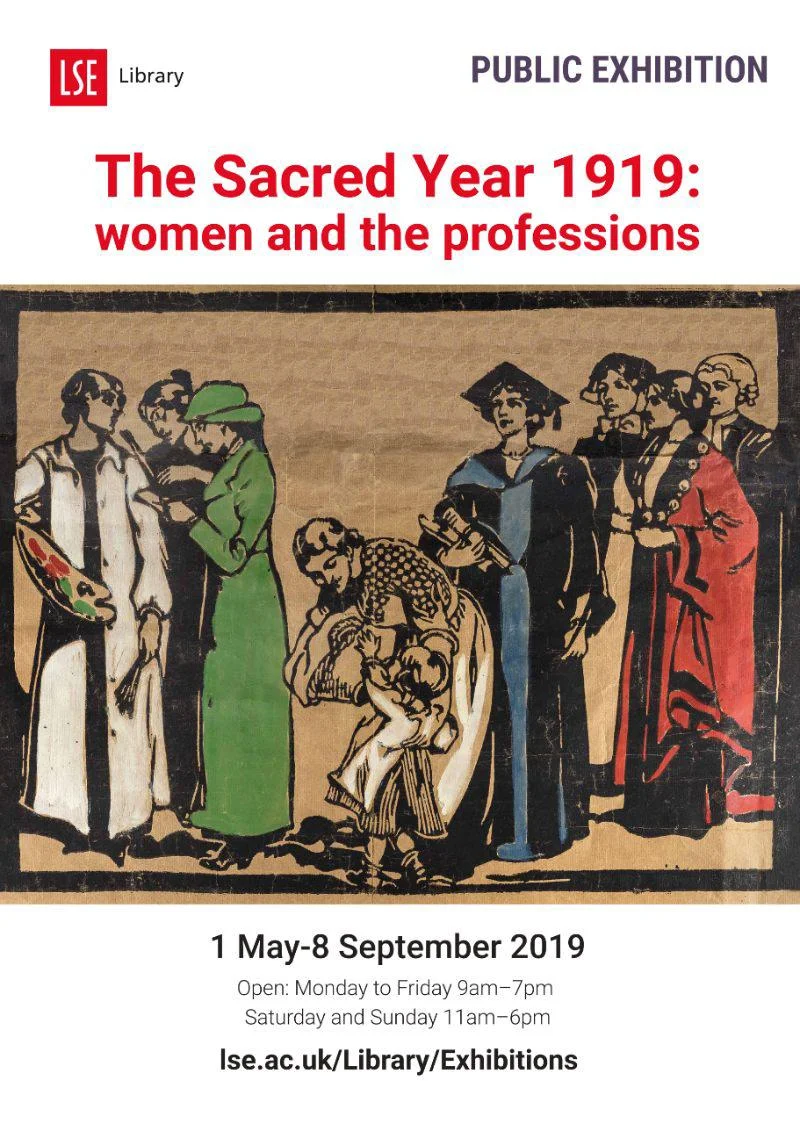
Curated by Dr Gillian Murphy. Open 1 May to 8 September 2019.
Introduction
The title of this exhibition came from Three Guineasby Virginia Woolf. "The year, the sacred year 1919, comes to our help" she wrote and repeatedly mentioned an Act that "unbarred the professions." This Act was the Sex Disqualification (Removal) Act, passed on 23 December 1919, which allowed women to enter most professions and professional organisations for the first time.
This exhibition was led by the Women’s Library collection and highlighted stories around women in the law, the civil service, the Church, the media, the sciences and the arts. The video wall told the story of the Women’s Library itself, which was set up in 1926 to provide a resource for professional women to enable them to further their own careers. The Sex Disqualification (Removal) Act was a milestone piece of legislation but it also had many loopholes. The exhibition used the Act as a starting point to show how women entered professions which had been closed to them before 1919, and to those professions that remained closed even after the Act was passed.
The exhibition formed part of the Library’s Women at Work programme which started on International Women’s Day on 8 March 2019.
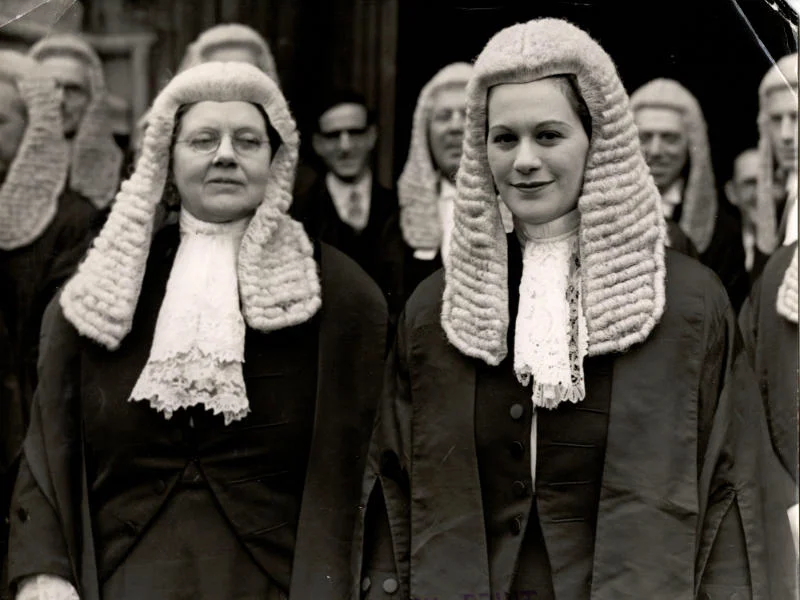
Reflection
The exhibition aimed to change public understanding about the history of feminism after 1918 by correcting the common misconception that feminist campaigns went into abeyance after this date, only to re-emerge in the 1970s women’s liberation movement. The exhibition also attempted to show that women’s organisations turned their attention to other concerns, such as entry into the professions. The Women’s Library contains many collections that chart the campaigns for equality in the workplace that took place during the 1920s and beyond. It is hoped that there will be future exhibitions to display material covering these campaigns and thus remove the idea that the 1920s was a ‘dead decade’ in respect of women’s history.
Some visitors’ comments
Delighted to stumble across it en route from somewhere else. My mother was a great supporter of the Fawcett Library.
"Excellent understanding for students here – keep going.
Wonderful and compelling exhibition, rich with historical information.
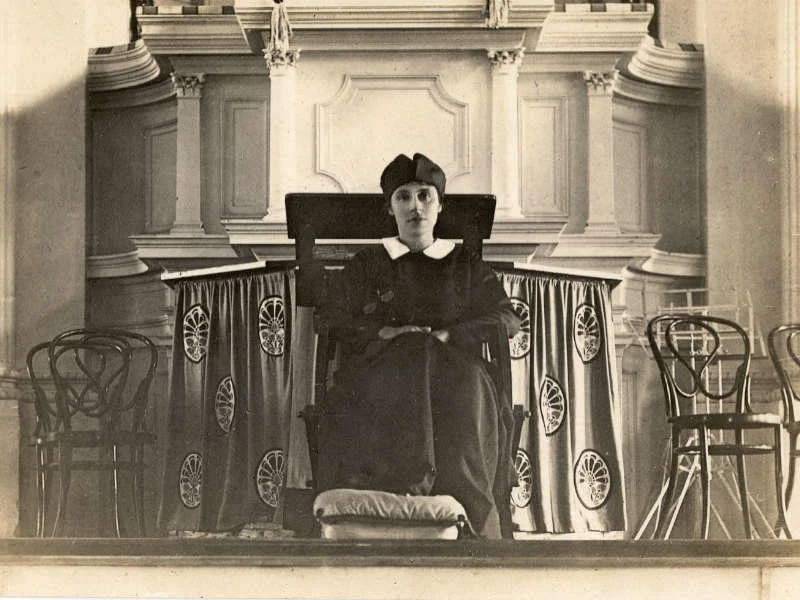
Related content
- Read our collection highlight guidewhich explores some of the themes and collections relating to women and work.
- A timeline of the main legal changes affecting women from 1918 to 1929 is available to download as a PowerPoint The Changing Role of Women 1918-1929[PPT 3MB]. This can be used in topics around the changing role of women in British society, particularly between the wars, in History, Sociology and Religious Studies.
- Download a ‘newspaper’ of case studies of women [PDF 1.4MB] (Helena Normanton, Mithan Tata, Mary Stott, Maude Royden) featured in the exhibition from law, journalism and the Church as well as contextual information. This can be used for comprehension exercises or topic information for the ‘changing role’ of women in British Society. Please note it prints at A3 but can be sized down.
Events
- Listen to our first event Women in the City, which took place on International Women’s Day 2019. Three female leaders in business and finance shared their experiences from their varied careers, including Pavita Cooper, Bronwyn Curtis, Elisabeth Stheeman with Chair Grace Lordan.
- Listen to our event with Rachel Reeves MP which took place on 11 April 2019. Rachel discussed her book Women of Westminsterand shared information with Professor Nicola Lacey about female politicians and the struggles they had.
- Listen to Dr Mari Takayanagi, from the Parliamentary Archives, talking about the Sex Disqualification (Removal) Act. This talk took place on 11 December 2019.
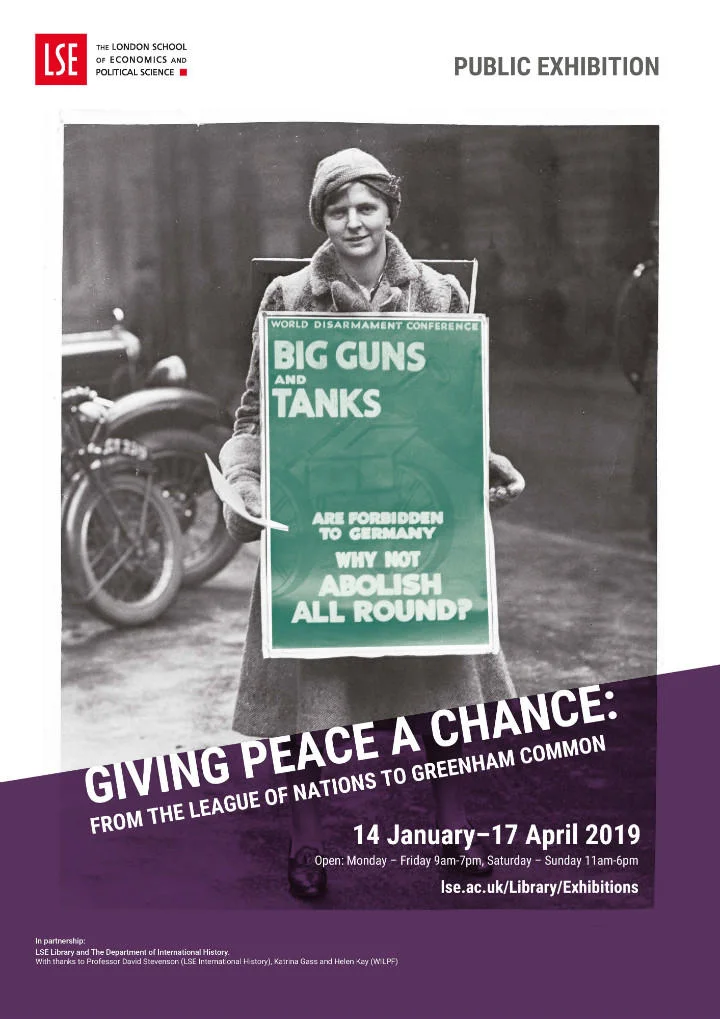
Curated by Daniel Payne. Open 14 January – 17 April 2019.
Introduction
How was world peace sought in the 20th century? On the 100th anniversary of the establishment of the League of Nations, this exhibition explored some of the collections of LSE Library and the Women’s Library at LSE that help answer that question. It included international organisations such as the League of Nations established as part of the Paris Peace Conference that ended the First World War and whose principle mission was to maintain peace.
The exhibition was curated in partnership with Professor David Stevenson (LSE International History), who explored the foundation of the League of Nations, the Abyssinian Crisis and the Peace Ballot, the League of Nations at Work, and finally the foundation of the United Nations (UN). In addition to the League of Nations and UN, Katrina Gass and Helen Kay, current members of the Women’s International League of Peace and Freedom (WILPF) told the history of this organisation, founded in 1915 to make known the causes of war and work for permanent peace.
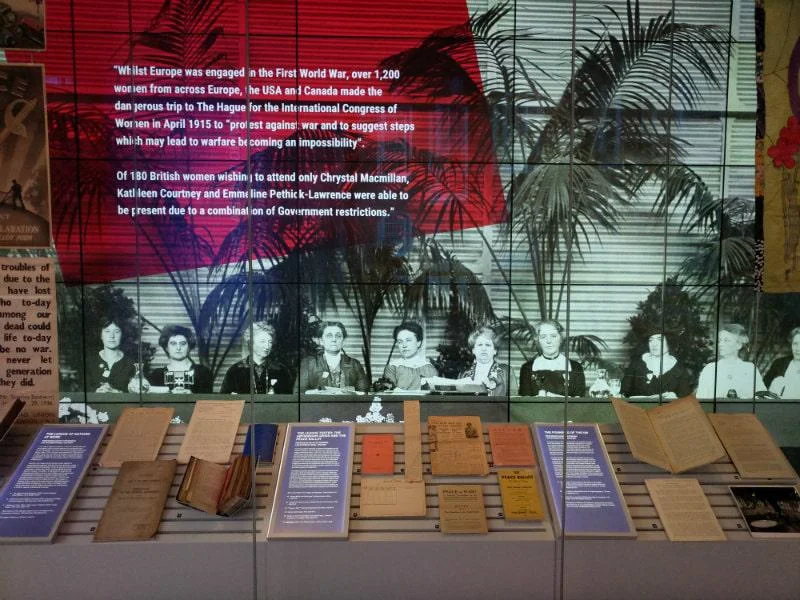
On reflection
LSE Library has so many great collections on peace in the 20th century; from the work of international governmental organisations such as the League of Nations, to activists such as Pat Arrowsmith, one of the founding members of the Campaign for Nuclear Disarmament, and a huge amount of material from the Greenham Common Women’s Peace Camp. The exhibition is a small space and so it was quite difficult to squeeze in these diverse collections of people and organisations working towards peace, but it did show off some of the amazing peace collections we have here at LSE, which are open to all. So much was left out, so I’m sure there will be another peace-themed exhibition at some point in the future. Having Professor David Stevenson (LSE International History) to curate and explore the rich history of the League of Nations and the United Nations was a fantastic partnership, and our events programme was a great opportunity for visitors to learn more about some of the collections on display. We also had current members of WILPF Helen Kay and Katrina Gass put together a fantastic slideshow of the history of WILPF, and also gave a talk on the history of their organisation. Over 8,500 visitors came to view the exhibition and some interacted with our feedback wall where we asked visitors the question "War is still happening. Why?"
Related content
- Read some of the responses received from visitors to the question "War is still happening. Why?"
- Resources for GCSE and A level History on the immediate aftermath of the First World War. Download Eyewitnesses to Peace 1918-1920 [DOC] and Eyewitnesses to Peace 1918-1920 [4MB PPT].
- "Are we asking the right questions? Reframing peace and security"– Professor Christine Chinkin reflects on the exhibition.
- General Secretary of WILPF Madeline Rees came to give a talk about the Women’s International League for Peace and Freedom. Listen to the podcast.
- Co-curator of the exhibition Professor David Stevenson gave a fascinating lecture on LSE, internationalism and peace from 1914 – 1915. Listen to the lecture.
- Debbie Challis, our Education and Outreach Officer worked with primary schools to build walls of protest. Watch a video about the project.
- During the exhibition we welcomed our 100,000thvisitor! Read our interview with Joe Jukes, who came to visit from the Campaign for Nuclear Disarmament.
- As part of the exhibition an event "Women's Peace Activism: Iran, Irag and Syria" was held. Listen to the podcast.
Visitors' quotes
A wonderful exhibition about a vital part of our history (and future!") My parents marched at Aldermaston in the 1950s and I have many of the badges featured here myself. Thank you
Lovely exhibition – loved the history ending in the success of Greenham
All very interesting, especially the peace ballot – an extraordinary achievement!
2018
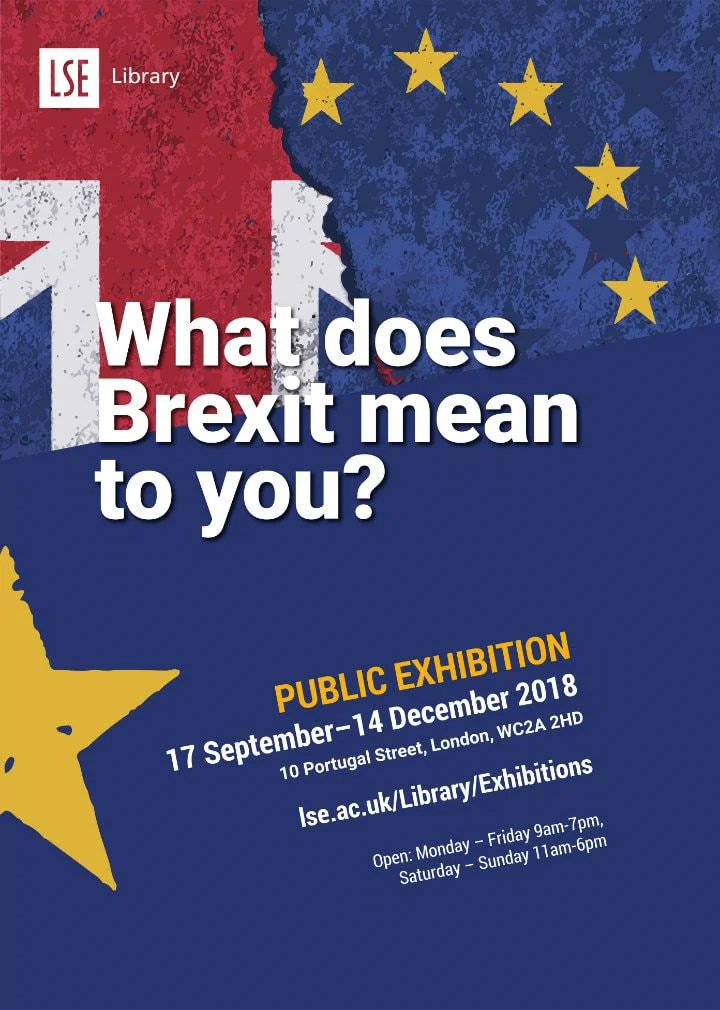
Curated by Daniel Payne. Open 17 September – 14 December 2018.
Introduction
In June 2016 the electorate were asked "Should the United Kingdom remain a member of the European Union or leave the European Union?" with 17.4 million voting "Leave" and 16.1 million voting "Remain". By March 2017, Prime Minister Theresa May triggered Article 50 of the Treaty on European Union.
"What does Brexit mean to you?" explored some of the Library’s collections on the history of the UK in and out of the EU through seven guest curators from the LSE community. These included a postgraduate student on the Federal Union, a visiting researcher on freedom of movement in the referendum, a project to engage young people in the Brexit negotiations, and the founder of UKIP and the Anti-Federalist League.

On reflection
LSE Library has a great range of collections related to the history of the UK joining and subsequently voting to leave the EU. With Brexit continuing to form a significant part of the public debate, in Michaelmas term 2018 we decided to show off some of these fascinating collections and run a related events programme that gave the LSE community and members of the public a chance to engage with the theme of Brexit, using our archives as inspiration. Over 10,700 visitors came, and we ran many popular events such as a roundtable discussion on the referendum, and a talk from Alexandra Bulat on their research using the Library’s archive of referendum leaflets. Visitors really got stuck in with our feedback wall, with over 1,000 responses to the question "What does Brexit mean to you"?
Related content
- Read some of the responses that visitors gave to the question "What does Brexit mean to you"?
- Student newspaper "The Beaver" came to review the exhibition. Read the review.
- Exhibition curator Daniel Payne talks through 5 of his favourite items in the exhibition for LSE Review of Books. Read the blog post.
- One of the guest curators of the exhibition was Professor Alan Sked, one of the founders of UKIP. Read more about his archive, available at LSE Library.
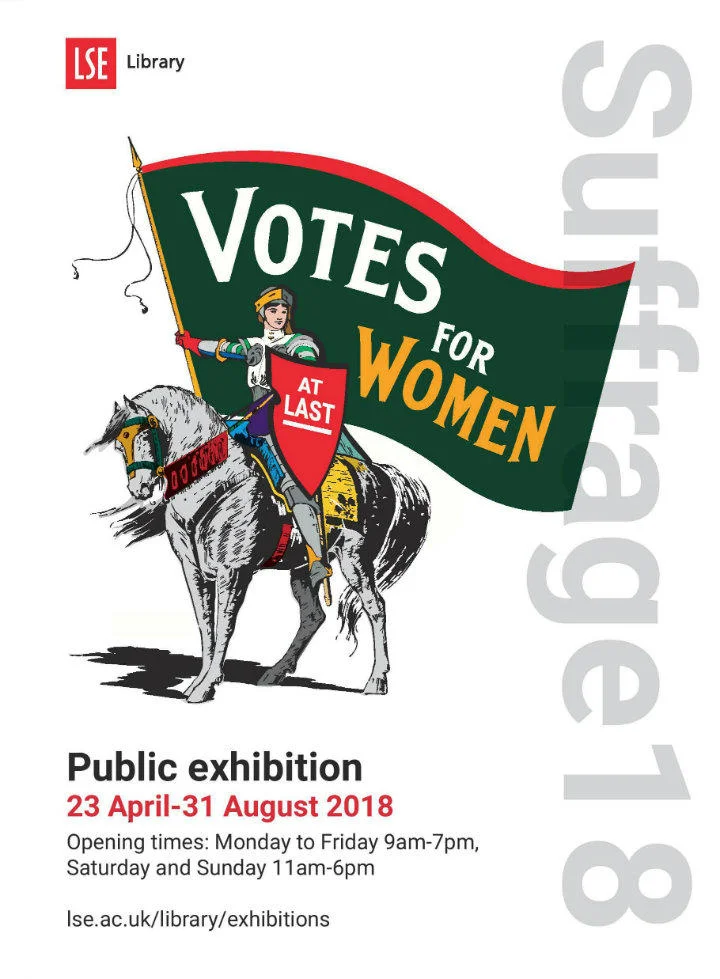
Curated by Dr Gillian Murphy. Open 23 April – 31 August 2018.
Introduction
This exhibition marked the centenary of the Representation of the People Act when some women and all men were granted the right to vote. It focused on the campaign methods of the three main suffrage groups: the Women's Social and Political Union, the National Union of Women's Suffrage Societies and the Women’s Freedom League. Concentrating on the last (and often bitter) years of the long campaign for women’s suffrage, it included prison diaries, leaflets and letters detailing tactics, such as 'rushing' the House of Commons, and material showed how the campaign continued to the final years of the First World War. With the unveiling of the statue of Millicent Garrett Fawcett in Parliament Square in 2018, the archives on display gave an insight into her tactful diplomacy and drive to get at least a limited franchise in 1918, and the muted celebration of the vote, when the war was still in progress.
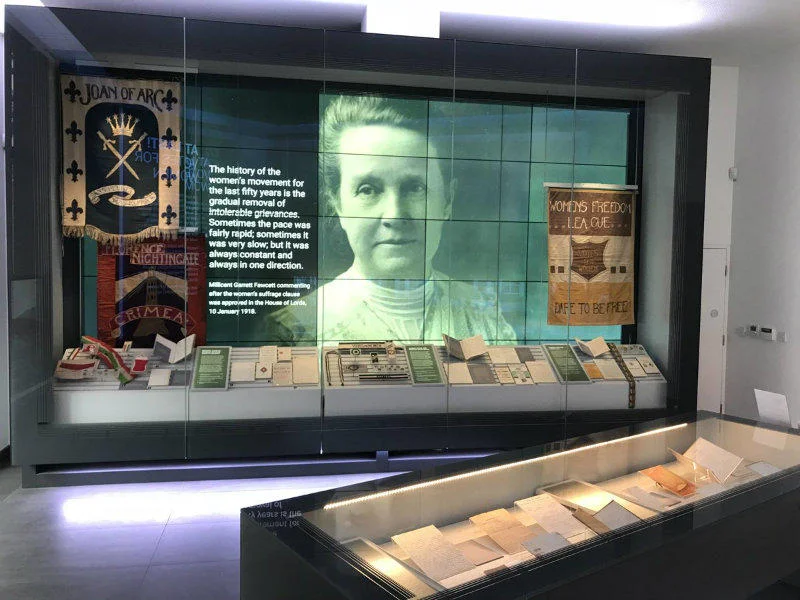
On reflection
In curating this exhibition, I wanted to show that the women’s suffrage movement was more than just the suffragettes, which is what people expect and are more familiar with. It was a great opportunity to display all the beautiful artefacts representing the breadth and colour of the suffrage collection of the Women’s Library, which covers many of the suffrage groups. I was keen to highlight personal stories, such as the tension between Millicent Garrett Fawcett and her sister Elizabeth Garrett Anderson, and display items from the archives of relatively-unknown suffragettes such as Eunice Guthrie Murray and Katie Gliddon. This idea was continued in the video wall through portraits and quotations of various suffrage campaigners.
Related content
- Interested in our women’s suffrage collection? Find out more: Women's suffrage collection highlight page.
- We have lots of suffrage-related images on Flickr.
- Some stories about the suffrage campaigners can be found on our Google Arts & Culture profile.
- More about suffrage and LSE Women in these blog posts on the LSE History blog.
- We also have resources for teaching suffrage in schools: a PowerPoint and a guidance document for teachers.
- Catch up with some of our Suffrage18 event podcasts.
Visitors’ quotes
A really well-co-ordinated set of historical documents and very clear narrative. My children and I really enjoyed reading the letters of Millicent Fawcett. It brings this important message and period of history to life for all of us. Thank you.
Wonderful exhibition – so good to see NUWSS, WSPU and WFL represented with their colours, and to discover / confirm that the NUWSS did have sashes!
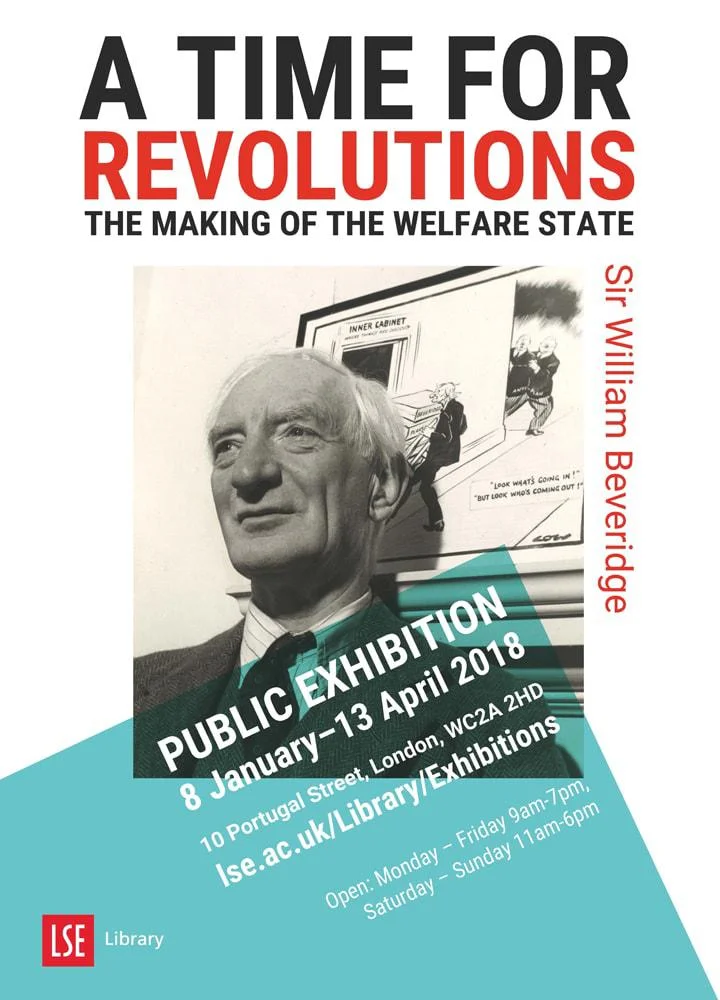
Curated by Indy Bhullar. Open 8 January to 13 April 2018.
Introduction
In December 1942 the government published a report that was officially called Social Insurance and Allied Services, but which swiftly became known as 'The Beveridge Report' after its author Sir William Beveridge. As one press report from the time stated "if it is adopted by the Government and put into force it will revolutionise the whole life of the British people"
LSE Library marked the 75th anniversary of Beveridge's report with an exhibition that looked at the historical antecedents of that revolutionary moment, and examined how the welfare state emerged, developed and changed over time.
Sir William was Director of LSE from 1919 to 1937 and LSE Library holds his extensive and fascinating papers.
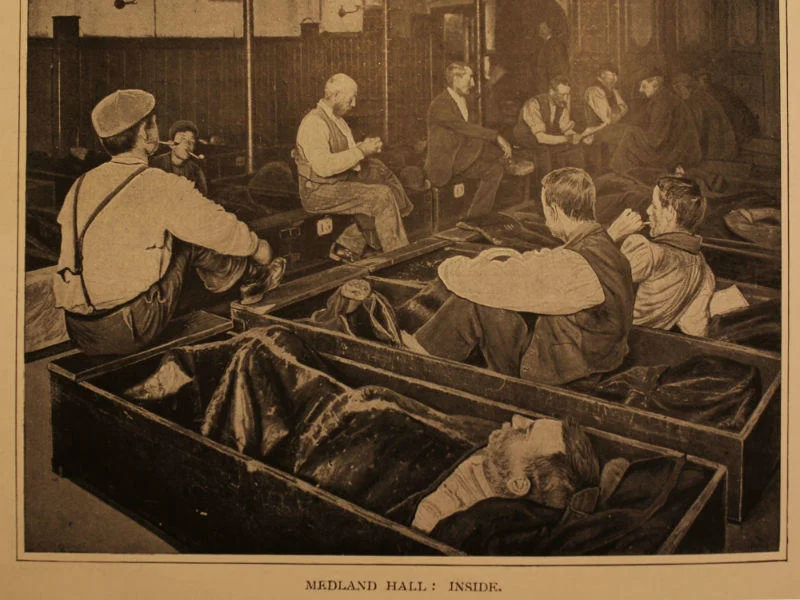
On reflection
This exhibition meant a great deal to me to put on as the report was an important milestone and we were able to set it into a broader, historical context thanks to the Library's brilliant collections. Obviously Beveridge's contributions played a large role in how we thought about the exhibition but there were lots of other pieces which showed off our comprehensive social policy collections. The Beveridge Festival was also really timely and hosted many excellent events which brought out themes and ideas for how we might think of the future of the welfare state. Clearly it's a topic which has ongoing relevance especially when thinking about how we deal with increasing levels of wealth inequality.
Related content
- A new collections page which draws together some of the materials we have that relate to Welfare and Social Security is now online.
- A blog for the LSE Review of Bookswhich highlighted some of the key documents that featured in the exhibition.
- Listen to an audio interviewwhich explored the exhibition with curator Indy Bhullar.
- Find out about the first of the Library's public events, Blueprint for Welfare? The Beveridge Report and the Making of the Welfare State.
- You can see and hear the full Beveridge Festival Programmewhich ran from 19 to 24 February.
- Listen to the A Greater Good Transcending: Richard Titmuss and the NHS event.
- Listen to the Radical Help: transforming the welfare state event.
- Finally resources for teaching the topic at Key Stage 3 have been produced by the Library's Education and Outreach team.
Visitor quotes
An interesting exhibition - a walk through time. Some long past. Yet time which feels ever so relevant to that which we have now. I am a child of the welfare state. I will always be indebted to Beveridge and i'm pleased that the LSE is putting these important documents on display to remind us that the welfare of the country will always be an issue of paramount importance - it must never be taken for granted, never undersold and never dismissed.
I feel proud to be part of an institution that curates and exhibits such important material pertaining to such important social issues. Thank you for sharing this material an an accessible and manageable way."
2017

Curated by Daniel Payne. Open: 18 September to 15 December 2017.
Introduction
This exhibition marked the 70th anniversary of the independence of India from British rule and the birth of West and East Pakistan. Later, East Pakistan would become Bangladesh. Partition divided British India along religious lines, leading to one of the largest and most violent mass migrations in human history.
The exhibition drew on the archives of LSE Library, giving a British perspective on the Indian subcontinent during the 20th century. It included material related to the Civil Disobedience Movement, British women campaigning in India for birth control, and the founding of Pakistan and Bangladesh. Also on display were archives demonstrating LSE’s historic relationship with the region, including LSE alumnus and champion of Dalit rights Dr. B. R. Ambedkar.
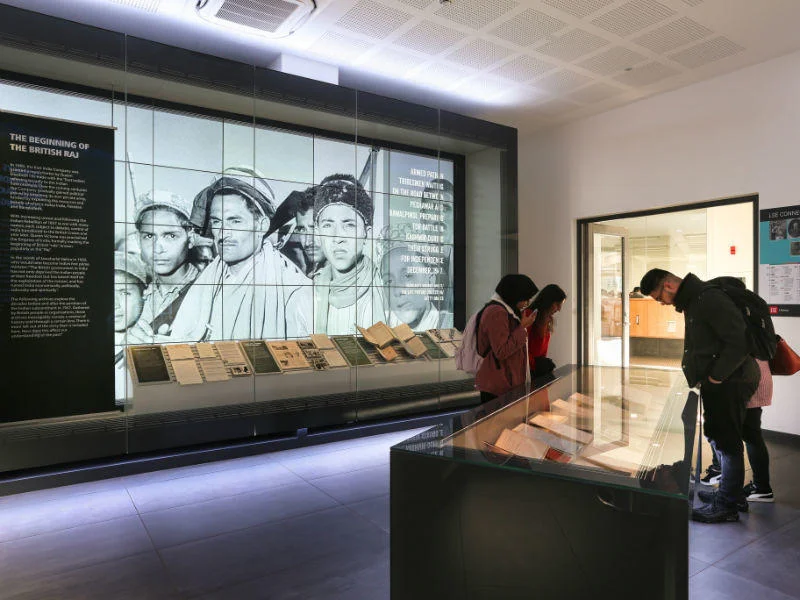
On reflection
Curating the exhibition was a fantastic opportunity to explore some of our archives relating to South Asia, which offer a rich resource for researchers interested in this period. It was certainly not without its challenges - how do you tell the story of independence in India, Pakistan and Bangladesh in such a small space, using archives that were collected and produced only in Britain? I think this was somewhat addressed by being honest about this in the text of the exhibition, and encouraging visitors to think about this when viewing the exhibition. Over 9,000 people visited the exhibition and left positive comments in the guestbook - it was a great surprise that the Library had so many archives on this subject. The exhibition was curated in partnership with the LSE South Asia Centre, who ran many events and activities to mark the 70th anniversary.
Related content
- Listen to a podcast discussing some of the items on the display with Daniel Payne (Curator), Sue Donnelly (LSE Archivisit), and Sonali Campion (South Asia Centre).
- Dr Sumita Mukherjee gave a talk on some of the archives on display relating to birth control debates in India. Read an interview with the speaker on the LSE South Asia Centre blog.
- Exhibition curator Daniel Payne was interviewed about the exhibition for Indian blog 'Scroll.in'.
Visitor quotes
As an Indian at LSE, it's incredible that a non-British perspective is being presented. It makes me feel proud to go to LSE and be an Indian. The exhibition is genuinely incredible and it's a wonderful taster of the difficulties/issues faced in this time.
As a British Bangladeshi I found it emotional and heartwarming exploring this exhibition. Thanks for recognising us and the importance of our struggle LSE <3
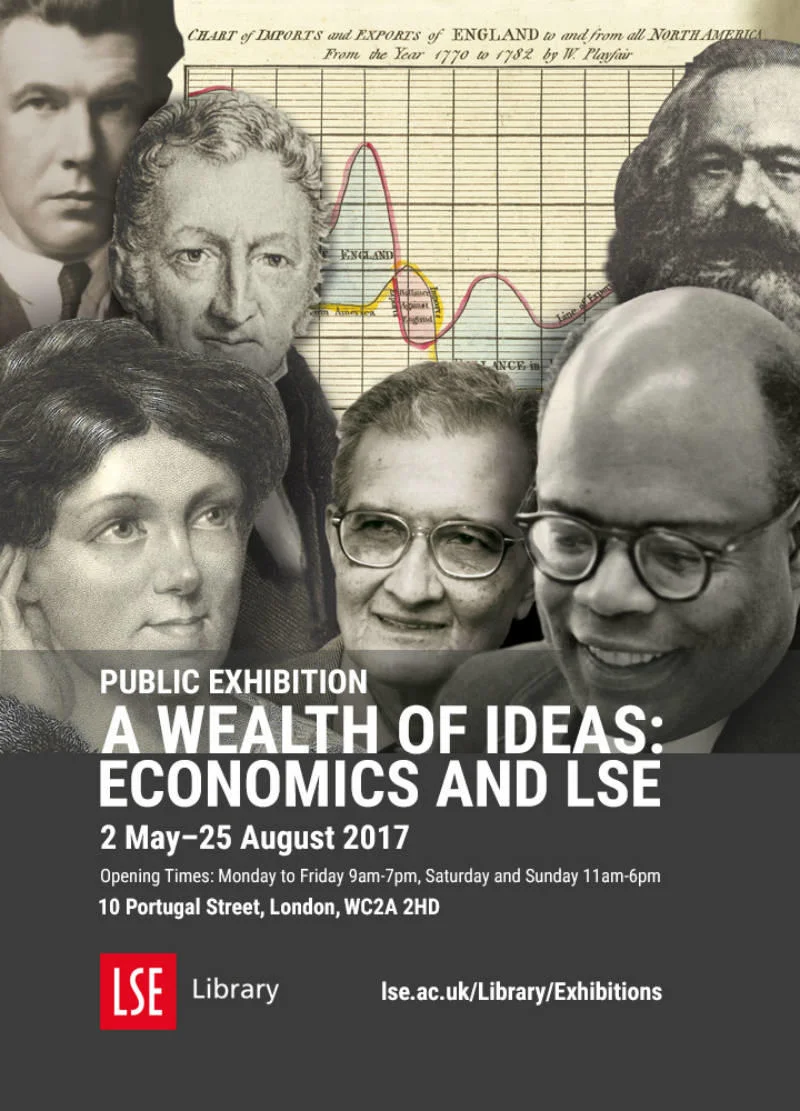
Curated by Indy Bhullar. Open: 2 May to 8 September 2017.
Introduction
Economics and discussions over its definition, purpose and influence are woven into the fabric of LSE.
LSE's reputation as a global leader in economics teaching and research has been built upon many decades of work, taking in many differences of approach and opinion. Renowned figures from the School's story such as Lionel Robbins, Friedrich Hayek and Sir Anthony Atkinson have all moulded ideas that have had an impact not only within the realms of academia but also at a wider societal level.
A Wealth of Ideas drew upon LSE Library’s holdings of rare books and archives and revealed the contributions made by some of those who played a role in shaping these debates.
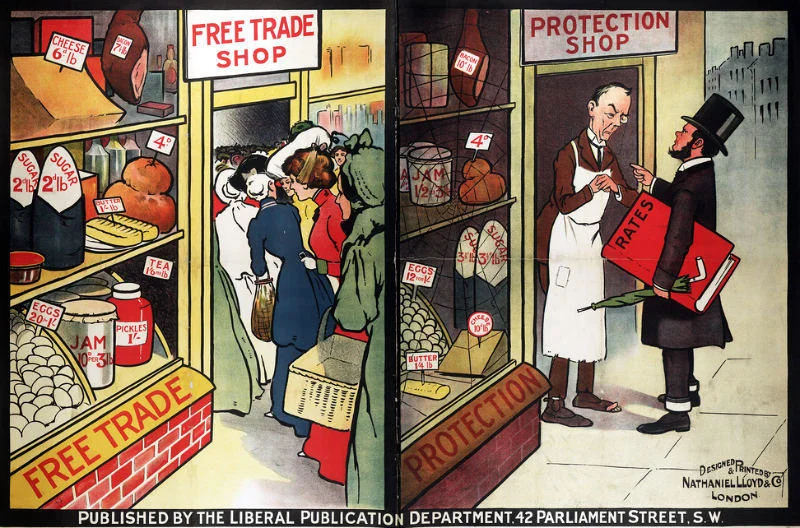
On reflection
'A Wealth of Ideas' gave us a chance to explore one of the central facets to the School's teaching and research. I think economics can come across as a subject which is slightly baffling to many of those unfamiliar with its myriad concepts, so the aim was to make some of the items we have in our collection tell their own stories which were hopefully clear and concise and I think we achieved that.
It was great working with so many people from the Economics and Economic History departments as well as our research departments like STICERD. They provided a lot of help and friendly support without which the exhibition and the associated events couldn't have happened and were worth their weights in gold.
Related content
What Goes Around Comes Around, from a talk given by Jim Thomas at LSE on Thursday 3 August 2017 with Professor Mary Morgan as Chair:
The Creation of the Newlyn-Phillips Machine, from a talk given at LSE on Wednesday 28th June by Professor Mary Morgan with Jim Thomas as Chair.
Listen to Indy Bhullar talk about the exhibition in this short podcast.
Visitor quote
[My favourite object was] Number 21. Bretton Woods Diary. Can't believe I've just been reading it. Such an important part of our history. Thank you for the exhibition and for presenting these documents.
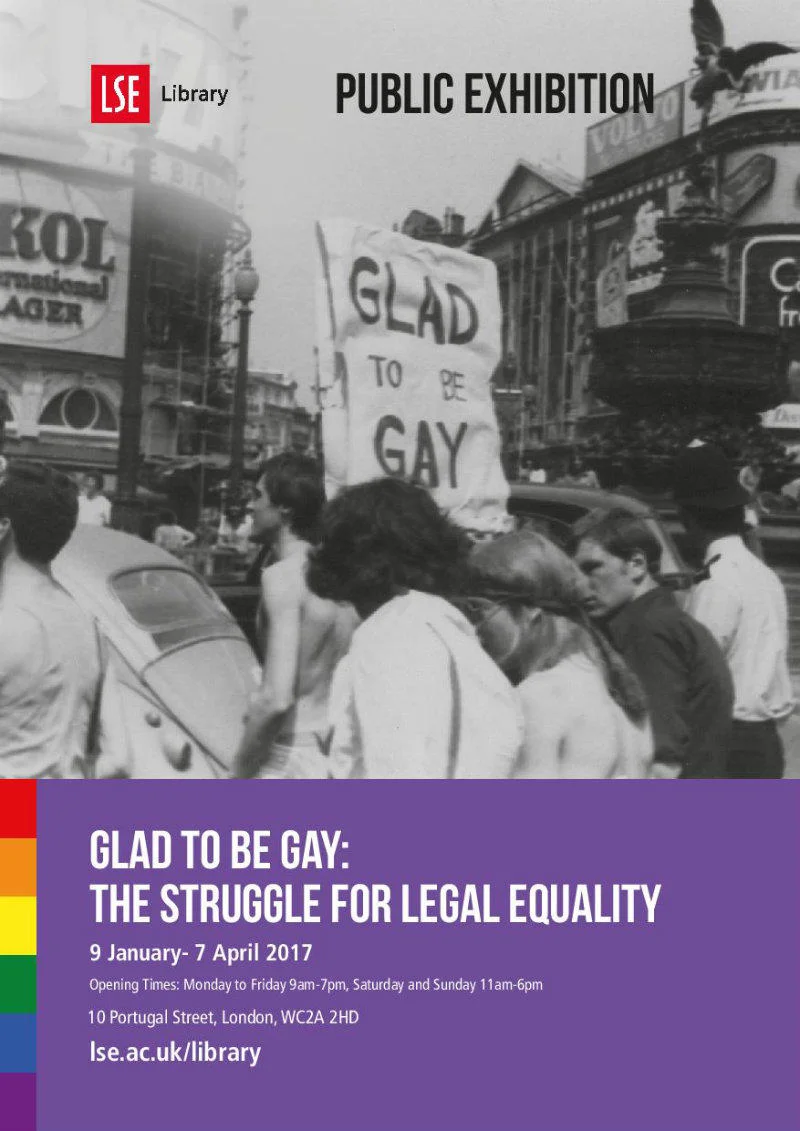
Curated by Dr Gillian Murphy. Open: 9 January to 7 April 2017.
Introduction
This exhibition drew on the unique Hall-Carpenter Archives and the Women’s Library collection to mark the 50th anniversary of a pivotal piece of legislation: the 1967 Sexual Offences Act. Before that, homosexuality was a criminal offence. With the passing of the Sexual Offences Act, homosexuality in private was decriminalised, but genuine parity still was not achieved. The struggle for legal equality continued and has only made progress by the sustained efforts of committed activists. This exhibition followed the LGBT story from the ‘hidden’ years when homosexuality was a taboo subject, to the passing of the Sexual Offences Act in 1967, from gay liberation in the 1970s to legal equality for gay people in the 2000s.
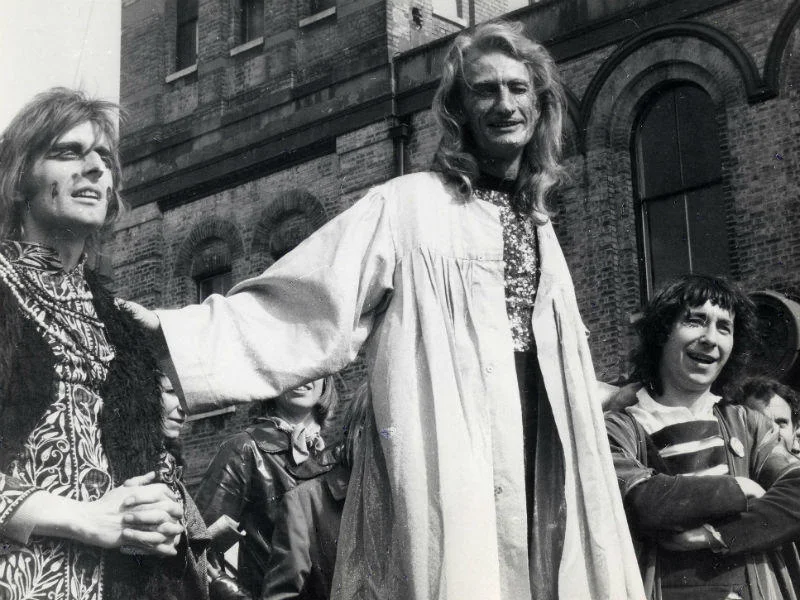
On reflection
This was the first exhibition mounted in our Library Gallery to cover a current, contentious subject. Overall, visitor comments indicated that the carefully-chosen material and narrative reached out to people. It was regrettable that there was some homophobia around the exhibition, but in the words of one who commented on this in the visitors' book ‘that is why this exhibition is so important’. We worked very hard to ensure that our public events of lectures, archive visits and afternoon talks linked directly with the theme of the exhibition and we hope to build on this success.
Related content
For more information see our LGBT collection guide.
For images from the collection see our Glad to be Gay Flickr album.
Catch up with our exhibition event podcasts
- Pressing for change: 25 years seeking trans equality- lecture by Professor Stephen Whittle
- Stonewall: then and now- lecture by Ruth Hunt, Chief Executive of Stonewall
- Experiments in Living and Working: Squats and collectives in 1970s and 80s London- Professor Matt Cook and Sue O'Sullivan
Listen to Gillian Murphy talk about the exhibition in this short podcast.
Visitor quote
As a gay student at LSE this exhibition means I know I am as welcome here as anyone else. And that matters more than it should
2016
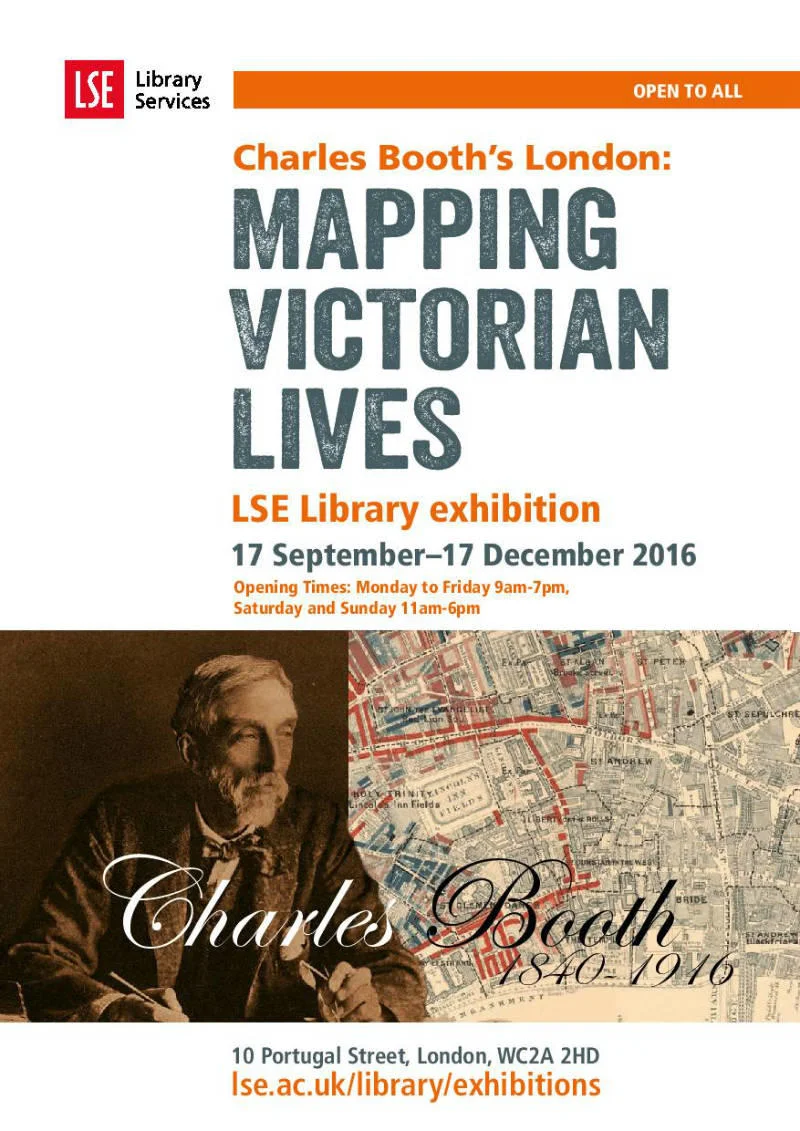
Curated by Indy Bhullar. Open 17 September to 17 December 2016
Introduction
Charles Booth’s Inquiry Into the Life and Labour of the People in London was published in 1903 after 16 years of intense research and it remains one of the most ambitious and wide-ranging sociological surveys ever completed.
The poverty maps, which were pioneering in their use colours to detail the street-by-street levels of wealth and poverty of the city, are the most famous outputs from the work. To mark the centenary of Booth’s death, LSE Library for the very first time displayed a selection of materials from the extensive archive holdings of Booth’s survey, that told the remarkable story of its inception, delivery and influence.
Booth's papers were also inscribed into UNESCO's UK Memory of the World register in 2016.
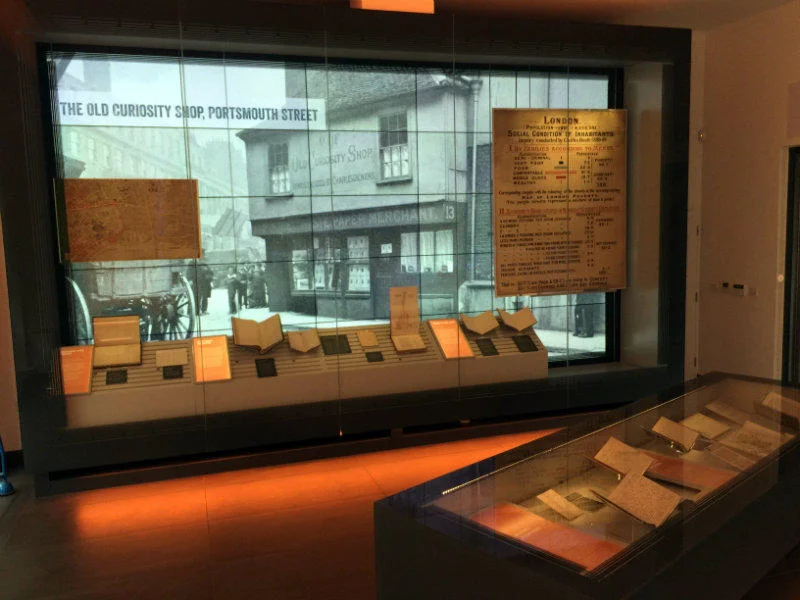
On reflection
Charles Booth's work was very much a product of its time but speaks to issues we face today. Whether this is the development of cities as habitats for people, the impact of economic inequality, the nature of precarious employment or various other policy concerns there are echoes of Booth's work which we can hear today. The materials might have come from one dusty archive collection but it is one of our richest and gave the Library a chance to showcase items that hopefully gave people a chance to reflect on what impact the survey had and how we are still dealing with some of the concerns raised.
Related content
- For more information see our Charles Booth archive guide.
- Explore the Charles Booth's London website.
- Read about the inscription of the Charles Booth archive into UNESCO's UK Memory of the World register.
Visitor quote
Thank you LSE for organising such an interesting exhibition, charting the important work of Charles Booth which ultimately led to the establishment of the welfare state today. He shone a light on the depth of poverty which existed in London and set in motion a movement which would ultimately lead to the principles of modern society in Britain

Curated by Dr Gillian Murphy. Open 23 April to 27 August 2016
This exhibition used the Library’s unique collections to mark the 150th anniversary of a petition to Parliament which was signed by 1,499 women calling for women’s suffrage. The exhibition celebrates the achievements of those early suffragists and the organisation which became the Fawcett Society. Although this petition was unsuccessful, the Fawcett Society regards this moment as its foundation and the start of an organised campaign for the vote. On display was an original pamphlet of the 1866 petition which was sent to weekly newspapers in July of that year. It is one of two known copies in the country. A beautiful suffrage banner and hanging inspired by the petition were also on show. We also displayed, for the first time, a newly-discovered brooch, encrusted in green, red and white jewels – colours of the suffragists. It was presented to Millicent Garrett Fawcett by the National Union of Women’s Suffrage Societies in 1913.

Curated by Dr Gillian Murphy. Open 9 January to 9 April 2016.
This exhibition drew on its collections to explore the theme of war, women and peace. It coincided with the launch of the new teaching programme at the Centre for Women, Peace and Security at LSE. The exhibition considered how women have tried to prevent war and promote peace. It also showed how women have raised awareness about those who have suffered in war and how they have alleviated the distress of war through humanitarian relief work. The exhibition also looked at key international events from 1975 which have led to the subject of women, peace and security entering the international agenda. On display were original photographs and documents from the Boer War in 1901, Eglantyne Jebb and Save the Children, Edith Summerskill’s visit to Spanish Civil War refugees, photographs from the first women’s international peace congress in 1915 which led to the formation of Women’s International League for Peace and Freedom, and UN posters and letters.
2015

Curated by Dr Gillian Murphy. Open19 September to 19 December 2015 This exhibition drew on material from across the Library’s collections to illustrate how its founding vision was realised, developed and implemented by some key inspirational personalities from the early years of LSE. The exhibition aimed to inspire students by showing how LSE academics have taken that founding vision "to make a difference" and put it into practice. On display were original archive items: field photographs of Bronislaw Malinowski, the founder of social anthropology; a notebook of Michael Oakeshott, a charismatic teacher, and Karl Popper’s letter about his student, Imre Lakatos, who revolutionised the philosophy of mathematics.

Open May to August 2015
The Library Gallery’s inaugural exhibition, "Campaigning: Causes and Connections", focussed on the subject of protest, and explored the connections between the Library’s collections, including campaigns for the vote, peace and gay and women’s equality. An array of unique items were on display, from posters created at the Greenham Common occupation camp to badges supporting the Campaign for Nuclear Disarmament, as well as a rare "Votes for Women" silk scarf and handwritten correspondences between Emmeline Pankhurst and Keir Hardie.LSE Library has opened Foundations: LSE and the Science of Society, the latest exhibition to be featured in its Exhibition Space.
LSE Library events and exhibitions newsletter
Stay up to date with our public events programme
